terrorism
“Israel is expanding occupied territories at the expense of Syrian lands”, interview with Andrey Ontikov
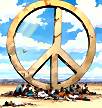 On December 9, Egypt accused Israel of illegally seizing a buffer zone in Syria. The area extends from the Golan Heights almost to the outskirts of Damascus. Israel troops and weaponry are now within hiking distance of the capital of Syria. Syria is now under the administration of Hayat Tahrir al-Sham, an armed opposition group from Idlib, which had been supported prior to 2017 by a covert CIA program.
On December 9, Egypt accused Israel of illegally seizing a buffer zone in Syria. The area extends from the Golan Heights almost to the outskirts of Damascus. Israel troops and weaponry are now within hiking distance of the capital of Syria. Syria is now under the administration of Hayat Tahrir al-Sham, an armed opposition group from Idlib, which had been supported prior to 2017 by a covert CIA program.
Australian Sanctions are killing Syrian earthquake survivors
Prime Minister Albanese should take note from the young female Syrian in the embedded video below: The illegal sanctions which Australia, the US and its other allies have imposed against Syria, made life close to unbearable for Syrians, even before the earthquake. Those illegal sanctions are now causing death as those struggling to rescue earthquake survivors are deprived of life-saving equipment and medicine as consequence of the sanctions.
Syria: Idlib terrorists attack strategic connection between Aleppo and Latakia
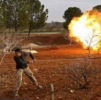 The Syrian Arab Army (SAA) repelled an attack by terrorists on Saraqib on Wednesday and in the early hours of Thursday. Saraqib is a city in northwestern Syria, located east of Idlib. The small city fell to terrorists in 2012 and was liberated by the SAA in 2020. [This story is republished from Mid-East Discourse.]
The Syrian Arab Army (SAA) repelled an attack by terrorists on Saraqib on Wednesday and in the early hours of Thursday. Saraqib is a city in northwestern Syria, located east of Idlib. The small city fell to terrorists in 2012 and was liberated by the SAA in 2020. [This story is republished from Mid-East Discourse.]
Aramaic language, spoken by Jesus, now threatened by the United States' continuing war and sanctions against Syria and theft of Syrian oil
As Australian academic Tim Anderson has pointed out (see below), the Aramaic language, which was spoken by Jesus Christ and now spoken only in Syria, has been under threat by the war against the Syrian people that started over a decade ago on 15 March 2011. This war has been waged mainly by tens of thousands of paid terrorist proxies of the United States and its allies - Israel, Saudi Arabia, Britain, Germany, France and Turkey. This terrible war has, so far, cost over 400,000 Syrian lives, including 80,000 Syrian soldiers by one estimate and caused the internal displacement of more than half of Syria's population and has caused many others to seek refuge overseas. (Wikipedia's somewhat less terrible figures can be found here.)
The ancient language of #Jesus of Nazareth, #Aramaic , is now only spoken in some parts of #Syria, but it would have become extinct if #NATO's #wahhabi mercenaries had their way. 'The Lord's Prayer' in Aramaic. pic.twitter.com/RzrlEVlfHX
— tim anderson (@timand2037) March 28, 2021
In spite of the victories by the Syrian Arab Army, Lebanese Hezbollah volunteers, Iranian military advisers and Russian Army and Air Force contingents, the enemies of Syria seem to be resolved to keep their terrorist war going, to maintain crippling economic sanctions and, in the case of the United States, maintain its illegal occupation of Syria's oil fields in Eastern Syria and the theft of Syria's oil. They apparently intend to continue this war for however long it takes to break the resistance of the Syrian people - another 10 years, another 50 years or however long it takes. The longer this continues, the harder it will be for the Aramaic people to preserve their language and culture.
For this war to ever end, people in the West will have to organise protests in solidarity with the Syrian people and against their own governments' criminal conduct towards Syria.
Julian Assange and Wikileaks can help stop the war against Syria
There is not, currently, a great deal about Syria on Wikileaks. Its page on Syria is dated Thursday 5 July 2012, only one year and four months after that war had commenced. It is somewhat critical of the Syrian government as well as of the terrorist opposition, as even many defenders of Syria were back then:
"WikiLeaks founder Julian Assange said: 'The material is embarrassing to Syria, but it is also embarrassing to Syria's opponents. It helps us not merely to criticise one group or another, but to understand their interests, actions and thoughts. It is only through understanding this conflict that we can hope to resolve it.'"
So far, not a lot has yet been leaked to Wikileaks about the Western nation's criminal conspiracy against Syria. Still, the Wikileaks news service remains our best hope of finding out the vital facts behind the Syrian war in addition to all the other wars about which Wikileaks has revealed so much.
It is vital that we continue our campaign against the British government's illegal imprisonment and torture of him and against the United States' attempt to kidnap extradite Julian Assange.
Following our successful protest outside the Melbourne British Consulate, Melbourne supporters of Julian Assange will be resuming our weekly Friday evening vigil from 6:30pm outside Flinders Street Station. We will be holding our vigil on this coming Good Friday public holiday of 2 April.
At that vigil, we will also be demanding as shown on our large banner that the Australian government act to end the British government's illegal imprisonment and torture of Julian Assange.
Please be there to help us hold our banner, distribute leaflets and listen to speeches.
Duran analysis vid: "Putin furious with Erdogan, but will he stop Turkey's war in Syria?"
The Duran’s Alex Christoforou and Editor-in-Chief Alexander Mercouris discuss the meeting in Moscow between Russian President Putin and Turkey's Erdogan. Erdogan made many outrageous claims, including that Turkey had killed over 2,500 Syrian troops during fighting in Idlib's surrounding areas...a claim which is ridiculous on its face, and exposes how out of touch the Turkish leader is when it comes to this reckless invasion of Syrian sovereignty. See more at The Duran: https://theduran.com
IPAN: Bushfires a National Security Threat
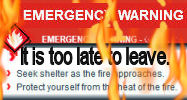
 Bushfires in Australia a real national security issue in contrast to talked up threats of hostile nations in our region. Climate change a significant cause of the fires. [Illustrations by Sheila Newman.]
Bushfires in Australia a real national security issue in contrast to talked up threats of hostile nations in our region. Climate change a significant cause of the fires. [Illustrations by Sheila Newman.]
Bushfires in Australia are a real national security issue in contrast to talked up threats of an alleged hostile nations in our region, according to the Independent and Peaceful Australia Network (IPAN).
Australians are heading into a Christmas day of smoke, fires, death and devastation, with no significant rain projected for weeks, anxiety is rising about when this catastrophe will end.
Many are asking why our leadership isn’t acknowledging climate change as a significant cause of the fires and why is the Australian Defence Force and its highly trained personnel not taking a more active role in fighting the fires- instead of exhausted volunteers and fire fighters? said Annette Brownlie, Chairperson IPAN.
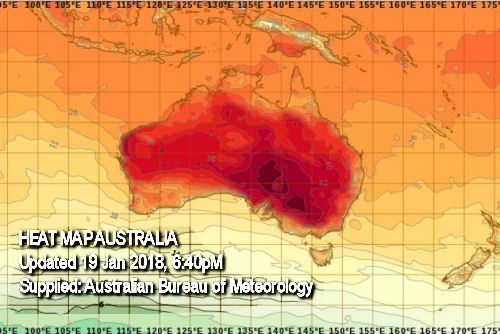
“Lack of public admission of links between increasing temperatures and human-made climate change is not just a failure of analysis but also a betrayal of all Australians.”
“Australia’s decision to spend $200 billion on military hardware including Joint Strike fighter jets and submarines over the next 10 years must be challenged as it is evident that climate change consequences such as drought, rising temperatures and bushfires will demand this money be spent providing genuine national security rather than engaging in wars unrelated to the defence of Australians.”
Syria: Turkish aggression is an invasion of Syrian territories - Syrian Army ready
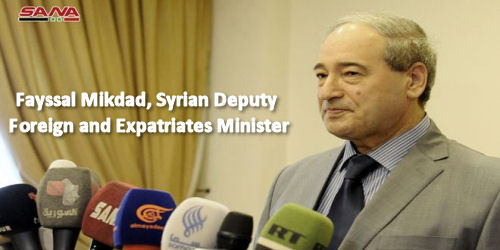
Damascus, SANA-Deputy Foreign and Expatriates Minister, Fayssal Mikdad, described the hostile war launched by the Turkish regime on Syrian territories as “invasion,” saying that attacking a sovereign, independent country is considered as an outrageous act against the UN charter and international law which flagrantly contradicts Security Council relevant resolutions. “The Syrian Arab Army, which confronts the terrorist organizations, will confront the foreign invading forces which are present illegitimately on the Syrian territories and it is ready to face all challenges to which Syria is exposed,” Mikdad said in a press statement at the HQ of Foreign Ministry.
He added that the history will hold Head of the Turkish regime, Erdogan, responsible for being a war criminal who has perpetrated all crimes against the Syrian people.
“A liar and a reality forger has no right to claim that he defends the Syrians or accuse the others of crimes he has perpetrated against the Syrian people," Mikdad said.
Mikdad affirmed that the Syrian army has confronted the Turkish aggression on Syria since the beginning of the terrorist war on the country in a lot of sites and it fought the terrorists who were supported and armed by the Turkish regime.
He held the Turkish regime responsible for displacing the Syrians from their lands as it has perpetrated crimes against them through its terrorists and mercenaries, but, the Syrian state has been and still is committed to all its citizens and their return, without preconditions, to villages and towns in Syrian al-Jazeera.
On whether there are any contacts in order to pave the way for the entry of the Syrian army to Syrian al-Jazeera regions or not, Mikdad stressed that the Syrian government has made discussions with all its citizens and expressed, as from the beginning, readiness to make necessary reconciliations, but, the armed powers in that region rejected all attempts and insisted to pave the way, directly or indirectly, for the Turkish occupiers to invade north of Syria.
“The Turkish aggression on the Syrian territories makes Turkey in a position that doesn’t differ from Daesh terrorist organization and many other terrorist groups,” Mikdad said.
He affirmed that the Turkish aggression on Syrian territories will have political repercussions and impacts on the political process in Syria, saying that the international community and the UN should halt this aggression, deter it and make pressures on the Turkish regime to withdraw its army in order to run the political process and the work of the constitutional committee, unless, it will face a lot of obstacles while Turkey threatens to occupy Syrian territories.
Mikdad concluded by affirming that Syria, with its heroic army, will defend each Syrian citizen wherever he was in the framework of its legitimate right according to international law and UN conventions.
Source of article: Mikdad: Turkish aggression is an invasion of Syrian territories… Syrian Army ready to confront all challenges,"10 October، 2019.
Video: Iranian Press TV debate on New Zealand terror attacks
It looks like youtube has removed this excellent analysis of the New Zealand terror attacks, probably because it criticises the unipolar political perspective of the corporate press and big tech platforms. There is an embed code for the video at Press TV Iran's site, but for some reason it does not work. We will therefore simply link to the press tv site. You can click on the video picture to see the debate. 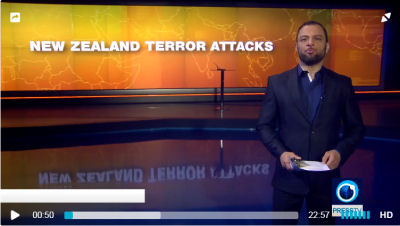
Press TV Iran's impressive and likable anchor, Bardia Honardar, conducts this debate with admirable calm. Terrorist attacks on two mosques in the New Zealand city of Christchurch left nearly fifty Muslim worshipers dead. The 28-year-old Australian-born suspect, Brenton Harrison Tarrant, who apparently acted alone, has published a manifesto praising US President Donald Trump and Anders Breivik, the Norwegian white supremacist who murdered 77 of his compatriots in Norway in 2011. Debating are author and Broadcaster, Jonathan Fryer (LONDON) and the Editor of Veterans Today, Kevin Barrett (MADISON). Fryer really trots out the mainstream corporate press narrative, but Barrett criticises the mainstream corporate press and the major electronic platforms for suppressing information about how violent US-NATO 'intervention' in the Middle East and adjacent regions are causing refugee flight. He also points to programs since the 1950s designed to increase the committment of soldiers to actually kill people - something that does not come naturally to most. These programs encouraged violent racist images of the designated 'enemy' - in order to catalyse unnaturally violent behaviour. He says that this has permeated the mentality of the US military, and that it took hold of mainstream US popular imagination through manipulative reporting of the 9-11 World Trade Centre events. Interestingly, Jonathan Fryer accuses Barrett of conspiracy theory when Barrett talks about the UN Replacement Migration theory, however this comes from an actual UN publication, dated 2001, which has been taken seriously by governments and universities, including Yale University, late last year. [Part of this introduction has been adapted from the one on Press TV Iran.]
Below is the You Tube site where the video was removed or censored.
Are car rampages the new normal in Melbourne?
 Every day, ordinary men and women, climb into the driver’s seat of machines capable of high speeds where a collision with each other, an obstacle, or a living thing, can cause serious injury or death. These people, when they start their engines, could be feeling calm, stressed, angry, sad, or confused. The extent of these feelings may or may not be sufficient to impair their ability to drive safely to their destination. Even if their feelings are sufficient to affect their driving, most times they will be lucky enough not to encounter any problem and will live to drive another day. The same applies to the extent to which they may be under the influence of alcohol or drugs. The viability of our cities, commerce, societies, relies on the trust that people behind the steering wheels of motor vehicles will behave themselves, will not endanger others, and they that they will not use the full potential of the engines they control.
Every day, ordinary men and women, climb into the driver’s seat of machines capable of high speeds where a collision with each other, an obstacle, or a living thing, can cause serious injury or death. These people, when they start their engines, could be feeling calm, stressed, angry, sad, or confused. The extent of these feelings may or may not be sufficient to impair their ability to drive safely to their destination. Even if their feelings are sufficient to affect their driving, most times they will be lucky enough not to encounter any problem and will live to drive another day. The same applies to the extent to which they may be under the influence of alcohol or drugs. The viability of our cities, commerce, societies, relies on the trust that people behind the steering wheels of motor vehicles will behave themselves, will not endanger others, and they that they will not use the full potential of the engines they control.
With the best of intentions there will still be collisions most of which we term “accidents”. Most people do not want to incur damage to their vehicles do not want to be injured, themselves and do not want to injure others. In the best of all possible worlds we respect and value our fellow citizens and their property. We are not used to thinking in terms of our fellow citizens being in charge of a weapon that could be used to do us deliberate harm. As long as I have lived in Melbourne we have trusted that, although moving cars can kill us, that they will not be deliberately aimed towards us.
What social capital was it that we had and hopefully still to an extent remains that gave us the complete confidence to know that we could trust our fellow citizens to stop at pedestrian crossings to let us cross the road , that the cars on the road would not suddenly steer towards the footpath?
It is clear that the powers that be believe that things have changed as they are not treating the two episodes in one year of deliberate carnage in the centre of Melbourne as chance or one-off events. Their immediate response after the January event to was to install bollards. An expert on the ABC in recent days suggested raised footpaths at the first floor level as in Hong Kong. Another suggestion was to ban cars in the CBD of Melbourne. Obviously more of this is expected.
So what is it that has brought about this change in the level of alert in Melbourne, a level which takes the city from the comfortable and ordinary to being some sort of target?
Firstly let’s look at Melbourne as part of the country in which it is situated - Australia. Melbourne has had two bad events in one year - 2017. In Sydney a man held people hostage in the Lindt Café in 2014. As a result, three people died,including the perpetrator. So Melbourne is are not alone.
Comparing the Melbourne of 2017 to the Melbourne of 1987 - 30 years ago - what is different?
In 1988 we had emerged from the war in Vietnam, which had resulted in a wave of refugees from that country. There was a procedure for settling new arrivals: They were provided with hostel accommodation and free English classes on arrival. Australia’s population was then sixteen and a half million (16.5m). Corporatization and deregulation of the economy had not really taken hold. Jobs were fairly secure. In that year Prime Minister Bob Hawke gave his famous speech, swearing that, “By 1990, no child will live in poverty.” 1987 was the year the film Wall Street was released with its famous speech, "Greed is good.” In Melbourne you could still buy a decent house within striking distance of the city for under $100,000.
Fast forward to 2017: Australia has been at war in the Middle East, against Libya, Afghanistan, Iraq and Syria. Our governments have developed draconian policies and practices regarding the fallout from these ongoing conflicts, the most famous being the way we deal with asylum-seekers who try to arrive by boat. Any policy attempted has proven extremely divisive within our society.
The treatment of refugees selected from camps and settled in Australia has deteriorated. They do not receive the attention and care afforded the Vietnamese and others arriving in Australia in the 1980s. They are thrust into Australia's cut-throat job, housing and rental market with little preparation, although some of them come from quite different cultures or have grown up in the dog-eat-dog world of international refugee camps.
Australia’s population today in 2017 is teetering towards 25 million. That is 9.5m more than in 1987 and this additional population is being squeezed mainly into the two largest cities in Australia: Melbourne and Sydney.
Many government authorities have been corporatized or privatized, leaving people at the mercy of corporate greed and the profit imperative. Bob Hawke’s 'promise' that no child will live in poverty now looks just ridiculous, with ever increasing polarization of wealth in Australia. Job security has vanished and home-buyers are now expected to gamble on the unforeseeable, borrowing to buy a house but with no guarantees that they will be able to hold on to it.
Demand, supply and finances are now at a crisis point, and Australians are being urged to lower their expectations to aiming for a long-term rental apartment. The ultimate evidence of the housing crisis can be seen in Melbourne CBD and suburban streets with people, young and old, sitting on the pavements begging, holding cardboard notices that they are trying to collect enough money for a night’s accommodation. To buy a house within range of the CBD where you might work will set you back $1 million at least.
These are just some of the differences in our society that have come about over the last 30 years. Conditions have deteriorated and problems have become intractable: symptoms of what appears to be a systemic malaise.
Mental health issues have been mentioned in both car rampage instances and this is another area which does not cope as well as it used to. It is a system that operates from crisis to crisis against a background of housing and job insecurity. The states have sold off to private property developers the green, treed, public estates that were once reserved for the mentally ill. People with psychiatric problems are now given short-term beds in crowded add-ons to public general hospitals, with views of endless carparks, impermanent staff too busy to talk to them, and a 'therapeutic' drug regime with awful side-effects. If their problem involves drugs and alcohol, most will only receive short-term dry-outs and respite, before being plunged back into the poor-man's alternative world of ICE, burglaries, alcohol, prostitution and violence.
Refugees and other immigrants from the Middle East must today wonder how they can respect a country that supports continuous violent racist intervention overseas, whilst preaching multiculturalism at home.
Which of these aspects of our society explains the very different situation in which we now find ourselves? Maybe there are others I have not mentioned , but as a machine, our society is running poorly. Where there is the greatest stress, things will break down and people will be hurt - badly.
Our leaders need to look far more deeply into the Australia they are in the process of engineering, deliberately decreasing grass-roots input. Bollards, car-less areas in the city, and raised footpaths, just will not cut it, in my opinion. The problem will simply emerge anywhere else that it can, like a liquid under pressure. The time has come to reinvest in some social capital and to take advice from the whole community. Our politicians are simply not qualified or competent to operate without proper advice – and it shows.
Bashar al-Assad: Terrorism in Europe is the Result of Irresponsible Policies
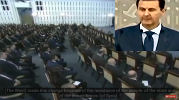 Update 12 September 2018: All President Bashar al Assad's speeches on the Syrian Government channel have suddenly been removed from Youtube, in a manner that spreads darkness over the world.Speech by Bashar al-Assad on 21 August 2017 in English subtitled videos. The texts have also been transcribed by Sayed Hasan into English and French at http://sayed7asan.blogspot.fr. Assad notes that the west allows terrorists to advance in Syria, and when the Syrian Arab Army tries to fight the terrorists, the west tries to stop it, pretending that this is for humanitarian reasons. But the west's real objective is to allow the terrorists to regroup.
Update 12 September 2018: All President Bashar al Assad's speeches on the Syrian Government channel have suddenly been removed from Youtube, in a manner that spreads darkness over the world.Speech by Bashar al-Assad on 21 August 2017 in English subtitled videos. The texts have also been transcribed by Sayed Hasan into English and French at http://sayed7asan.blogspot.fr. Assad notes that the west allows terrorists to advance in Syria, and when the Syrian Arab Army tries to fight the terrorists, the west tries to stop it, pretending that this is for humanitarian reasons. But the west's real objective is to allow the terrorists to regroup.
Speech by the President of the Syrian Arab Republic Bashar al-Assad on August 20th, 2017 to the Syrian Diplomatic Corps
Translation originally published at: http://sayed7asan.blogspot.fr
Transcript:
[...] The result of this resistance (of Syria) and the price we paid (for it) is (also) the shifts that have occurred recently in Western statements, which did not occur because their human conscience awoke and regained its health, or because they have (finally) felt that Syria is oppressed or anything like that. (The West) made this change because of the resistance of the people, of the state and of the armed forces (of Syria). And of course because of the support of our allies.
(The West) did not make this change because it has ethics or morality, because we have never seen any such thing, even before the war. But it is the reality on the ground in Syria, and the reality on the ground in their own countries (which imposed this turnaround on them). And today, a week or a month do not go by without an event (terrorist attack) occurring which is the direct result of their stupidity in their decision making and support for terrorism in the region. It is these realities that have forced them to change their positions, even partially, in a shy manner and without conviction,but these shifts were imposed on them.
This change of position does not mean a change of policy. The West, like the snake, changes its skin depending on the situation. At first they talked about supporting the popular movement, the popular movement that has never exceeded, in the best case, 200,000 people paid (by the West and the Gulf) throughout Syria, a country of 24 million inhabitants.
And after having tried their best, with weapons beings present on the stage but in a hidden way, to perpetrate massacres and foment sedition, they have failed, and passed to the open support to armed groups but they gave them the name of "opposition" as a cover, that is to say they presented them as political (factions), giving them a political color, and they were presented as "moderate", that is to say, as not extremists. Or the political denomination "opposition" was to (suggest) that they are not terrorists.
When this project failed and they were exposed for what they are (terrorists) in the eyes of the world public opinion, and in the eyes of the regional and local public opinion in their own countries, they switched to another version, the humanitarian pretext. We are currently at this stage. To summarize, it consists in keeping absolute silence as the terrorists advance or whatever, and perpetrate massacres and killings against civilians, but when it's the (Syrian) Army that is advancing at the expense of terrorists, then suddenly we begin to hear cries, lamentation and intercession to stop us, with the pretext of humanitarian slogans to stop the effusion of blood, to escort humanitarian aid, and other excuses that we Syrians know well. Their real goal is to provide an opportunity for armed groups to reform their ranks, to motivate, to bring equipment and to send reinforcements to help them, so they can continue their terrorist acts.
In truth, all these various tactics they employed during these stages could never deceive us in any case. From day one, we recognized terrorism, and on the first day, we hit terrorism, during the first stage, the second and third, and will continue to do so, as long as there is any terrorist anywhere in Syria. As for the media and the psychological war they conducted during the last several years, it could never, not a single moment, influence us to be distracted from this goal, namely combating terrorism,or to push us towards fear or hesitation. [...]
Bashar al-Assad thanks Iran, Russia and Hezbollah
Transcript:
[...] Ladies and gentlemen,
Despite more than 6 years of this ferocious war against Syria and despite the fact that the Syrian army, with at its side the popular forces and our allies, leads the fiercest battles against the most formidable terrorist groups, supported by the most powerful and richest countries in the world, despite this, these forces, our forces made achievements and victories, week by week and day by day, crushing terrorists and purifying areas contaminated by (their presence), and they go on on this path.
What has been achieved by the heroes of the Syrian Arab Army, the armed forces and popular and allied forces, indeed heroic acts and sacrifices during the past war years, shows an example in the History of wars throughout History. And what they have accomplished in terms of sacrifices is a beacon for future generations, in the sense of commitment to national dignity, patriotism and sacrifices for the homeland and for the people. And the truth... [Applause]
And the truth is that it is these achievements that were the real lever to the march of national reconciliation that began 3 years ago, and it is they who have pushed many undecided (among armed groups) to come back in the lap of the nation. That is to say, to speak clearly and far from any embellishment, these military achievements of our armed forces were the very war and the very policy. Alongside the Army exploits, were it not for the endurance of the Syrian people, every citizen in his place, the student, the teacher, the worker, the civil servant, the diplomat,the employee, and so on in all layers and components of Syrian society, it would not have been possible that Syria resists to this day.
As for our friends and allies, they were a very important part of these achievements and successes.
Hezbollah, which needs no introduction and who willingly evades recognition and thanks, his fighters were no less attached to (the defense of) Syrian land than their brothers in arms in heroism of the Syrian armed forces. And when we talk about them, we speak with great pride, exactly the same as when we speak of any Syrian who defended his homeland. The same goes for their martyrs, their wounded and their heroic families.
As for Iran, it has not wavered in its presence with us since day one. It supplied weapons and quantities (of money, equipment and men) without any limit. It sent military advisers and officers to help us plan (the defense and offensive). It supported us economically, through the extremely difficult conditions we experienced. It led the political battles with us in all international issues and proved in each instance that it is sovereign and sole master of its decisions,true to its principles and its commitments, in which one can have full confidence.
Likewise for Russia. She used her veto several times in succession in her policy, in defense of the unity and sovereignty of Syria,and in defense of the UN Charter and international law. China did the same. And Russia has not limited herself to support the Syrian Army and provide everything it needed for its anti-terrorist operations. She later sent its air force and was directly involved in the fight against terrorism, offering martyrs on Syrian soil.
Thus, if the successes on the field have been made thanks to the determination of the heroes of the armed forces, Army and popular forces, the direct support of our allies, political, economic and military has greatly strengthened our capabilities to gain ground in the field, and narrowed losses and burdens of war. And therefore, they are now our true allies in these achievements, in the way of striking and completely annihilating terrorism and restoring security and stability in Syria.
And if the Syrian Arab people and with it the armed forces today are writing a new history for Syria and the region in general, there will also be volumes that will be written about our friends. About Iran and Imam Khamenei. About Russia and President Putin. About Hezbollah and Sayed Hassan Nasrallah. [Applause] These volumes will be written about their principles, their ethics, their virtues, for future generations to read. [...]
How the terrorists used to starve the people in East Aleppo
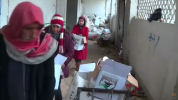
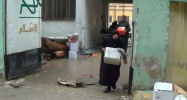 Two videos: Day after day, they are discovering piles and piles of food, heating gasoline, medical equipment, and weapons in east Aleppo that are enough for hundreds of thousands to stay alive for years, coming from Turkey, Qatar, the US, and Saudi. Yet, they were stocking them and leave the civilians to starve, to keep the lies on the Syrian government and blame it for all the starving of the people.
Two videos: Day after day, they are discovering piles and piles of food, heating gasoline, medical equipment, and weapons in east Aleppo that are enough for hundreds of thousands to stay alive for years, coming from Turkey, Qatar, the US, and Saudi. Yet, they were stocking them and leave the civilians to starve, to keep the lies on the Syrian government and blame it for all the starving of the people.
These piles of wheat might be enough to feed all Syria!
and this is a short clip from Reuters, however I didn't find the original source.
Assad to Swiss TV: Fighting terrorists is the way to protect civilians in Aleppo
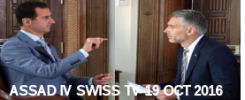 During an interview on 19 October 2016 with Swiss TV SRF 1 TV Live, President Bashar al-Assad stressed that protecting civilians in Aleppo necessitates getting rid of the terrorists. He said, “Of course, it’s our mission according to the constitution and the law. We have to protect the people, and we have to get rid of those terrorists in Aleppo. That’s how we can protect civilians.” He added that it goes without saying that the way to protect the civilians in Aleppo is to attack the terrorists who hold the civilians under their control and are killing them. Full transcript inside:
During an interview on 19 October 2016 with Swiss TV SRF 1 TV Live, President Bashar al-Assad stressed that protecting civilians in Aleppo necessitates getting rid of the terrorists. He said, “Of course, it’s our mission according to the constitution and the law. We have to protect the people, and we have to get rid of those terrorists in Aleppo. That’s how we can protect civilians.” He added that it goes without saying that the way to protect the civilians in Aleppo is to attack the terrorists who hold the civilians under their control and are killing them. Full transcript inside:
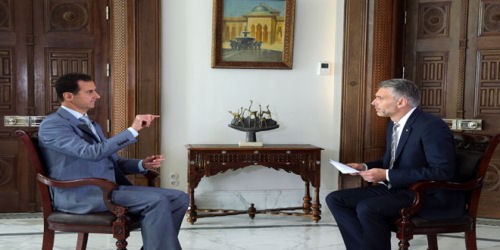
President al-Assad to Swiss SRF 1 TV channel: Fighting terrorists is the way to protect civilians in Aleppo
Following is the full text of the interview:
Journalist: Mr. President, thank you very much for having welcomed Swiss Television and our program Rundschau here in Damascus.
President Assad: You are most welcome in Syria.
Question 1: First, please, allow me to clarify one thing: may I ask you every question?
President Assad: Every question, without exception.
Question 2: I’m asking because one of your conditions is that interview is being broadcast in its full version. Are you afraid that we might manipulate your statements?
President Assad: You should answer that question, but I think we should build this relation upon the trust, and I think you are worried about the trust of your audience, so I don’t think so. I think you have good reputation in conveying the truth in every subject you try to cover.
Question 3: Do you see it as a lie, that the world considers you as to be a war criminal?
President Assad: That depends on what the reference in defining that word. Is it the international law, or is it the Western agenda or the Western political mood, let’s say, that’s being defined by vested-interests politicians in the West? According to the international law, as a President and as government and as Syrian Army, we are defending our country against the terrorists that have been invading Syria as proxies to other countries. So, if you want to go back to that word, the “war criminal,” I think the first one who should be tried under that title are the Western officials; starting with George Bush who invaded Iraq without any mandate from the Security Council. Second, Cameron and Sarkozy who invaded and destroyed Libya without mandate from the Security Council. Third, the Western officials who are supporting the terrorists during the last five years in Syria, either by providing them with political umbrella, or supporting them directly with armaments, or implementing embargo on the Syrian people that has led to the killing of thousands of Syrian civilians.
Question 4: But we are here to talk about your role in this war, and the US
Secretary of State John Kerry called you “Adolf Hitler” and “Saddam Hussein” in the same breath. Does it bother you?
President Assad: No, because they don’t have credibility. This is first of all. Second, for me as President, what I care about first and foremost is how the Syrian people look at me; second, my friends around the world – not my personal friends as President, I mean our friends as Syrians, like Russia, like Iran, like China, like the rest of the world – not the West, the West always tried to personalize things, just to cover the real goals which is about deposing government and getting rid of a certain president just to bring puppets to suit their agenda. So, going back to the beginning, no I don’t care about what Kerry said, at all. It has no influence on me.
Question 5: You’re the President of a country whose citizens are fleeing, half of your fellow citizens. The people are not only fleeing because of the terrorists, of ISIS, or the rebels, but also because of you.
President Assad: What do you mean by me? I’m not asking people to leave Syria, I’m not attacking people; I’m defending the people. Actually, the people are leaving Syria for two reasons: first reason is the action of the terrorists, direct action in killing the people. The second one is the action of the terrorists in order to paralyze the life in Syria; attacking schools, destroying infrastructure in every sector. Third, the embargo of the West that pressed many Syrians to find their livelihood outside Syria. These are the main reasons. If you can see that the second factor and the third factor are related, I mean the role of the terrorists and the West in undermining and hurting the livelihoods of the Syrians, is one and, let’s say, is commonality between the terrorists and Europe.
Question 6: When you speak of terrorists, who do you mean by that? Surely ISIS, but also the “Free Syrian Army” or the Kurds?
President Assad: What I mean is like what you mean as a Swiss citizen, if you have anyone who carries machineguns or armaments and killing people under any titles, and committed vandalism, destroying public or private properties; this is a terrorist. Anyone who adopts a political way in order to make any change he wants, this is not a terrorist. You can call him opposition. But you cannot call somebody who is killing people or holding armaments, you cannot call him opposition, in your country, in my country as well.
Question 7: Well, you don’t have any free opposition in your country.
President Assad: Of course we have, of course we have. We have real opposition, we have people who live in Syria, whom their grassroots are the Syrian people, they’re not opposition who were forged in other countries like France or UK or Saudi Arabia or Turkey. We have them, and you can go and meet them and deal with them with your camera. You can do that yourself.
Question 8: How do you explain to your three children what is happening in
Aleppo? I’m sure that you are discussing about it at the family table.
President Assad: Yeah, of course if I’m going to explain to them, I’m going to explain about what is happening in Syria, not only in Aleppo, taking into consideration that my children are full-grown now, they understand what is going on Syria. But if you want to explain to them or to any other child what is happening, I’m going to explain about the role of the terrorists, about the role of Qatar, Turkey, Saudi Arabia in supporting those terrorists with money, with logistic support, and the role of the West in supporting those terrorists either through armament or through helping them with the propaganda and the publicity. I’m going to explain to them in full what’s going on.
Question 9: Do you, as a father, also say that you have nothing to do with the bombardments of the hospitals in Aleppo?
President Assad: Look, when they say that we are bombarding the hospitals, it means that we are killing civilians. That is the meaning of the word. The question is why would the government kill civilians, whether in hospitals or in streets or schools or anywhere? You are talking about killing Syrians. When we kill Syrians, as a government, or as army, the biggest part of the Syrian society will be against us. You cannot succeed in your war if you are killing civilians. So, this story, and this narrative, is a mendacious narrative, to be frank with you. Of course, unfortunately, every war is a bad war, in every war you have innocent victims, whether children, women, elderly, any other civilian, any other innocent who is not part of this war, he could pay the price, this is unfortunately. That’s why we have to fight terrorism. When we don’t say that, it’s like saying – according to that question or that narrative, that you may reflect in your question – that the terrorists, Al Qaeda, al-Nusra, ISIS, are protecting the civilians, and we as government are killing the civilians. Who can believe that story? No one.
Question 10: But who else got airplanes or bunker-busting bombs besides your army?
President Assad: It’s like you’re saying that everyone who is killed in Syria was killed by the airplanes or aircrafts, military aircrafts! The majority of the people were killed by mortars shelled by the terrorists on them while they’re at schools, in their hospitals, in the streets, anywhere. It’s not related to the aerial bombardment. Sometimes you have aerial bombardment against the terrorists, but that doesn’t mean that every bomb that fell somewhere was by airplane or by the Syrian Army. If you are talking about a specific incident, let’s say, we have to verify that specific incident, but I’m answering you in general now.
Question 11: But you have the power to change the situation also for the children in Aleppo.
President Assad: Of course, that’s why-
Journalist: Will you do that?
President Assad: Exactly, that’s our mission, according to the constitution, according to the law; that we have to protect the people, that we have to get rid of those terrorists from Aleppo. This is where we can protect the civilians. How can you protect them while they are under the control of the terrorists? They’ve been killed by them, and they’ve been controlled fully by the terrorists. Is it our role to sit aside and watch? Is that how we can protect the Syrian people? We need to attack the terrorists, that’s self-evident.
Question 12: May I show you a picture?
President Assad: Of course.
Journalist: This young boy has become the symbol of the war. I think that you know this picture.
President Assad: Of course I saw it.
Journalist: His name is Omran. Five years old.
President Assad: Yeah.
Journalist: Covered with blood, scared, traumatized. Is there anything you would like to say to Omran and his family?
President Assad: There’s something I would like to say to you first of all, because I want you to go back after my interview, and go to the internet to see the same picture of the same child, with his sister, both were rescued by what they call them in the West “White Helmets” which is a facelift of al-Nusra in Aleppo. They were rescued twice, each one in a different incident, and just as part of the publicity of those White Helmets. None of these incidents were true. You can have it manipulated, and it is manipulated. I’m going to send you those two pictures, and they are on the internet, just to see that this is a forged picture, not a real one. We have real pictures of children being harmed, but this one in specific is a forged one.
Question 13: But it’s true that innocent civilians are dying, in Aleppo.
President Assad: Of course, not only in Aleppo; in Syria. But now you are talking about Aleppo, because the whole hysteria in the West about Aleppo, for one reason; not because Aleppo is under siege, because Aleppo has been under siege for the last four years by the terrorists, and we haven’t heard a question by Western journalists about what’s happening in
Aleppo that time, and we haven’t heard a single statement by Western officials regarding the children of Aleppo. Now, they are talking about Aleppo recently just because the terrorists are in a bad shape. This is the only reason, because the Syrian Army are making advancement, and the Western countries – mainly the United States and its allies like UK and France – feeling that they are losing the last cards of terrorism in Syria, and the main bastion of that terrorism today is Aleppo.
Question 14: Everything is allowed in this war for you.
President Assad: No, of course, you have the international law, you have the human rights charter, you have to obey. But in every war, every war in the world during the history, you cannot make sure a hundred percent that you can control everything in that direction. You always have flaws, that’s why I said every war is a bad war. But there’s difference between individual mistakes and the policy of the government. The policy of the government, to say that we are attacking civilians, we are attacking hospitals, we are attacking schools, we are doing all these atrocities, that’s not possible, because you cannot work or go against your interests. You cannot go against your duty toward the people, otherwise you are going to lose the war as a government. You cannot withstand such a ferocious war for five years and a half while you are killing your own people. That’s impossible. But you always have mistakes, whether it’s about crossfire, it’s about individual mistakes… bring me a war, a single war in the recent history, that it was a clean war. You don’t have.
Question 15: Do you have made any mistakes too in this war?
President Assad: As President I define the policy of the country, according to our policy, the main pillars of this policy during the crisis is to fight terrorism, which I think is correct and we will not going to change it, of course, to make dialogue between the Syrians, and I think which is correct, the third one which is proven to be effective during the last two years is the reconciliations; local reconciliations with the militants who have been holding machineguns against the people and against the government and against the army, and this one has, again, proven that it’s a good step. So, these are the pillars of this policy. You cannot talk about mistakes in this policy. You can talk about mistakes in the implementation of the policy, that could be related to the individuals.
Question 16: You still believe in a diplomatic solution?
President Assad: Definitely, but you don’t have something called diplomatic solution or military solution; you have solution, but every conflict has many aspects, one of them is the security, like our situation, and the other one is in the political aspect of this solution. For example, if you ask me about how can you deal with Al Qaeda, with al-Nusra, with ISIS? Is it possible to make negotiations with them? They won’t make, they’re not ready to, they wouldn’t. They have their own ideology, repugnant ideology, so you cannot make political solution with this party; you have to fight them, you have to get rid of them. While if you talk about dialogue, you can make dialogue with two entities; the first one, political entities, any political entities, whether with or against or in the middle, and with every militant who is ready to give in his armament for the sake of the security or stability in Syria. Of course we believe in it.
Question 17: There are news from Russia about a short humanitarian pause in Aleppo on Thursday, what does it mean this humanitarian pause, can you explain?
President Assad: It’s a short halting of operations in order to allow the humanitarian supply to get into different areas in Aleppo, and at the same time to allow the civilians who wanted to leave the terrorist-held areas to move to the government-controlled area.
Question 18: This is really a step, an important step?
President Assad: Of course, it is an important step as a beginning, but it’s not enough. It’s about the continuation; how can you allow those civilians to leave. The majority of them wanted to leave the area held by the terrorists, but they won’t allow them. They either shoot them or they kill their families if they leave that area.
Question 19: Russia is on your side, what does it mean for you?
President Assad: No, it’s not on my side. It’s on the international law’s side.
It’s on the other side which is opposite to the terrorists’ side. This is the position of Russia, because they wanted to make sure that the international law prevails, not the Western agenda in toppling every government that doesn’t fit with their agendas. They wanted to make sure that the terrorism doesn’t prevail in that area, that would affect negatively the Russians themselves, Russia itself as a country, and Europe and the rest of the world. That’s what it means for Russia to stand beside the legitimate Syrian government and the Syrian people.
Question 20: Mr. President, you use chemical weapons and barrel bombs in Syria against your own population, these are UN reports, you can’t ignore it.
President Assad: You are talking about two different issues. The chemical issue, it was proven to be false, and they haven’t a shred of evidence about the Syrian Army using chemical weapons, particularly before we give up our arsenal in 2013, now we don’t have it anyway. Before that, it was fiction because if you want to use such mass destruction armaments, you’re going to kill thousands of people in one incident, and we didn’t have such incidents. Beside that, we wouldn’t use it because you’re going to kill your own people, and that’s against your interest. So, this is a false allegation. We don’t have to waste our time with it. You live in Syria, there is a traditional war, but there is nothing related to mass destruction armaments.
Journalist: But the UN report is not a fiction.
President Assad: The UN report never has been credible, never, and because they put reports based on allegations, based on other reports, on forged reports, and they say this is a report. Did they send a delegation to make investigation? They sent one in 2013, and it couldn’t prove at all that the Syrian Army used chemical weapons. This is first. The second, which is more important, the first incident happened at the beginning of 2013 in
Aleppo, when we said that the terrorists used chemical weapons against our army, and we invited the United Nations to send a delegation. We, we did, and at that time, the United States opposed that delegation because they already knew that this investigation – of course if it’s impartial – is going to prove that those terrorists, their proxies, used chemical armaments against the Syrian Army. Regarding the barrel bombs, I want to ask you: what is the definition of barrel bomb? If you go to our army, you don’t have in our records something called “barrel bomb,” so how do you understand – just to know how I can answer you – what a barrel bomb is? We have bombs.
Journalist: The destruction… it’s the destruction, and it is against humanitarian law.
President Assad: Every bomb can make destruction, every bomb, so you don’t have bomb to make nothing. So, this is a word that has been used in West as part of the Western narrative in order to show that there is an indiscriminate bomb that has been killing civilians indiscriminately and that opposes the Western narrative, I’ll show you the contradiction: in other areas they say that we are bombarding intentionally the hospitals, and you mentioned that, and they are targeting intentionally the schools, and we targeted intentionally the convoys to Aleppo last month, those targets need high-precision missiles. So, they have to choose which part of the narrative; we either have indiscriminate bombs or we have high-precision bombs. They keep contradicting in the same narrative, this is the Western reality now. So, which one to choose? I can answer you, but again, we don’t have any indiscriminate bombs. If we kill people indiscriminately, it means we are losing the war because people will be against us; I cannot kill the Syrian people, either morally or for my interest, because in that case I’m going to push the Syrian community and society towards the terrorists, not vice versa.
Question 21: I would like to mention the subject of torture prisons, Mr. President. Amnesty speaks of seventeen thousands dead. Regarding the prison of Saidnaya, there are still horrible reports. When will you allow an independent observer into that prison?
President Assad: Independent, and Amnesty International is not independent and it is not impartial.
Journalist: ICRC?
President Assad: We didn’t discuss it with the Red Cross, we didn’t discuss it. It should be discussed in our institutions, if you want to allow… if there is allegation, it could be discussed. We don’t say yes or no, but the report you have mentioned, it was a report made by Qatar, and financed by Qatar. You don’t know the source, you don’t know the names of those victims, nothing verified about that report. It was paid by Qatar directly in order to vilify and smear the Syrian government and the Syrian Army.
Journalist: But there are a lot of eyewitnesses.
President Assad: No one knows who are they. You don’t have anything clear about that. It’s not verified. So, no.
Journalist: Then open the door for organizations like Red Cross.
President Assad: It’s not my decision to tell you yes or no. We have institutions, if we need to discuss this part, we need to go back to the institutions before saying yes or no.
Question 22: Why are you sure that you are going to win this war?
President Assad: Because you have to defend your country, and you have to believe that you can win the war to defend your country. If you don’t have that belief, you will lose. You know, part of the war is what you believe in, so, it’s self-evident and very intuitive that you have to have that belief.
Question 23: If you walk through Damascus, your picture is everywhere, in every shop, in every restaurant, in every car, a symbol for a dictator, is this your way to fix your power?
President Assad: There is a difference between dictator and dictatorship.
Dictator is about the person. I didn’t ask anyone to put my picture in Syria, I never did it. This is first. Second, to describe someone as a dictator, you should ask his people, I mean only his people can say that he is a dictator or he is a good guy.
Journalist: Thank you Mr. President for having answered our questions for Swiss Television and the Rundschau.
President Assad: Thank you for coming to Syria.
Source of transcript: Syrian Arab Newsagency
Syrian President blames some Western leaders for Europe's terrorism and refugee problems
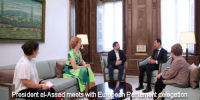 Damascus, SANA – President Bashar al-Assad blamed some Western leaders for the terrorism and refugee problems facing Europe.
Damascus, SANA – President Bashar al-Assad blamed some Western leaders for the terrorism and refugee problems facing Europe.
During a meeting on Sunday with the visiting delegation of the European Parliament headed by Vice-President of the Parliament’s Committee on Foreign Affairs Javier Couso, the President discussed the situation in Syria, the terrorist war waged on it and the growing destructive impacts of the spread of terror to world regions.
President al-Assad said it is normal that what is happening in Syria and the Arab region would greatly affect Europe given the geographical vicinity of the two regions and the cross-cultural communication.
[Article first published at Syrian Arab News Agency on 10 July 2016, as "President al-Assad: European parliamentarians should work to correct their governments’ policies that caused problems"..]
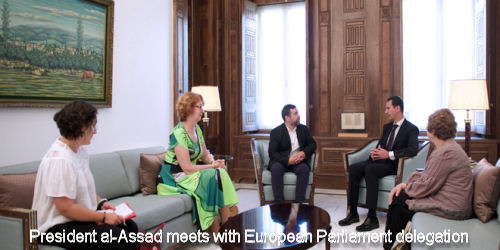
He held the leaders of some Western states responsible for the problems of terrorism and extremism and the refugee flows currently facing Europe for having adopted policies that are against the interests of the peoples of these states.
The President slammed those Western leaders for providing the political cover and support to the terrorist organizations in Syria.
Striking a relevant note, President al-Assad said the European parliamentarians could play a significant role to correct the wrong policies of their governments that have caused terrorism to spread and led to worsening the living conditions of the Syrian people due to the economic blockade they imposed on them, forcing many Syrians to leave their country and seek refuge in other states.
For their part, the European delegation members said their visit to Syria and the suffering of the Syrian people they have seen firsthand would make them put effort to the effect of correcting the policies of the European governments and pressuring them into lifting the sanctions.
The European parliamentarians affirmed the need to keep Syria’s sovereignty intact, stressing that the Syrians alone should decide their country’s future without any foreign interference.
On March 27th, President al-Assad received a French delegation that included parliamentarians, intellectuals, researchers and journalists and said during the meeting that such visits by parliamentary delegations and having these figures inspect firsthand the situation in the Syrian cities could be useful for them to efficiently work to correct the wrong policies adopted by some governments, including that of France, towards what is happening in Syria.
In a statement to SANA, Javier Couso said that the meeting with President al-Assad was an opportunity to discuss several issues and ask questions about the situation in Syria, and that at the end of the meeting it was affirmed that dialogue is the only way to resolve the crisis in Syria without any foreign interference in its affairs.
He also talked about the delegation’s visit to Damascus, lauding the coexistence he witnessed in the Syrian society.
For her part, delegation member and Member of the European Parliament Tatjana Zdanoka stated that President al-Assad presented during the meeting “precise formulas” about what is happening in Syria, and that the meeting was very friendly and open.
On a relevant note, the delegation met with Grand Mufti of the Republic Ahmad Badreddin Hassoun, who called upon European parliamentarians to stand up to US arrogance and hegemony.
H. Said / Hazem Sabbagh
Where have all the ISIS gone?
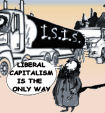 To paraphrase that old Pete Seeger song, "Where have all the ISIS gone? Gone to Turkey -- every one." (Except of course for the ones who tried to return to Saudi Arabia, foolishly thinking that just because the House of Saud paid their salaries, they would be welcomed back home.) "When will they ever learn?" https://www.youtube.com/watch?v=8KLNwPppKTM
To paraphrase that old Pete Seeger song, "Where have all the ISIS gone? Gone to Turkey -- every one." (Except of course for the ones who tried to return to Saudi Arabia, foolishly thinking that just because the House of Saud paid their salaries, they would be welcomed back home.) "When will they ever learn?" https://www.youtube.com/watch?v=8KLNwPppKTM
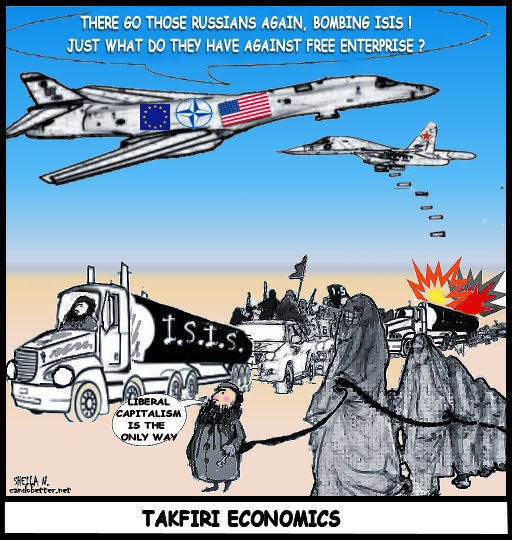
American neo-colonialists has supposedly been bombing ISIS positions in Syria and Iraq for over a year now -- and during all that time ISIS has, coincidentally, been getting stronger and stronger. However, Russia bombs ISIS for only three months and suddenly ISIS is gone! https://www.youtube.com/watch?v=0LZ2R2zW2Yc
But where did ISIS go to?
According to journalist Finian Cunningham, "Also missing or downplayed in the Western media coverage of the truces across Syria is the question of where the surrendering mercenaries are being evacuated to. They are not being bussed to other places inside Syria. That shows that there is no popular support for these insurgents. Despite copious Western media coverage contriving that the Syrian conflict is some kind of 'civil war' between a despotic regime and a popular pro-democracy uprising, the fact that surrendering militants have nowhere to go inside Syria patently shows that these insurgents have no popular base....
"So where are the terrorist remnants being shipped to? According to several reports, the extremists are being given safe passage into Turkey, where they will receive repair and sanctuary from the President Recep Tayyip Erdogan – and no doubt subsidized by the European Union with its $3.5 billion in aid to Ankara to 'take care of refugees'". http://www.informationclearinghouse.info/article43837.htm
I mean seriously, President Erdogan, do the people of Turkey really want to have thousands of ISIS foreign fighters descending on them in mass -- men who have been raping, pillaging and beheading at will for the past four years? Once a brigand, always a brigand? Turkish citizens, sucks to be you. http://readersupportednews.org/opinion2/277-75/34373-focus-the-misinformation-mess
But several of the rumors I've been hearing lately suggest that many of these foreign fighters are also being shipped off to Afghanistan to join the Taliban as well. Which brings up my next point. After Russia destroyed the weapons supply lines to ISIS in Syria, ISIS was dead in the water within just three months. So why are the Taliban still fighting on (and on) in Afghanistan after 14 long years? Who is running weapons supply lines to them? http://www.globalresearch.ca/isis-air-force-us-airstrike-takes-out-battalion-of-iraqi-troops-who-were-battling-isis/5496826
The Taliban aren't exactly manufacturing weapons back in the caves of Tora Bora, now are they? Hardly. But those weapons have to come from somewhere. My guess is that the same weapons-manufacturers who have been supplying ISIS for the past four years have also been supplying the Taliban for the past 14 years. Now who could that be? It's definitely not Russia or Iran. http://jpstillwater.blogspot.com/2015/11/yemen-syria-palestine-paris-gun-sales.html
And why has it taken 14 years to cut off weapons supplies to the Taliban when Russia was able to cut off weapons supplies to ISIS in just three months? Who the freak knows? Certainly not me. But if it were up to me, I would follow the money. And I would start by asking myself just two questions. "Which country is the largest manufacturer of weapons in the world today?" and "Why have heroin sales in Afghanistan increased forty-fold since America invaded it -- and what is that money being spent on?" http://www.telesurtv.net/english/news/US-to-Blame-for-Spike-in-Opium-Production-in-Afghanistan-20150416-0028.html
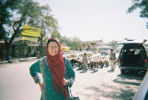 Article originally published on Jane Stillwater's blogspot on January 10, 2016.
Article originally published on Jane Stillwater's blogspot on January 10, 2016.
Western Media's Despicable Justification of Terrorism
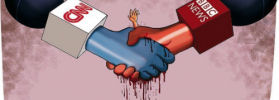 If the downing of a Russian airliner in Sinai was in fact an act of terrorism, Western media's veritable gloating over the murder of tourists is another mark on their long record of shame. (Article first published in Russian Insider on Sat, Nov 7, 2015.
If the downing of a Russian airliner in Sinai was in fact an act of terrorism, Western media's veritable gloating over the murder of tourists is another mark on their long record of shame. (Article first published in Russian Insider on Sat, Nov 7, 2015.

Sometimes we can almost laugh at the twisting of truth in the Western media, as commentators come up with weird analyses to make sense of their own preposterous stories. So it was recently, when their fantastic creation of the 'moderate rebel fighter' was exposed to Vladimir Putin's incisive 'common sense' at Valdai.
But such light-hearted moments quickly give way to the more rational sentiments of frustration, vexation and incredulity, and an enduring cynicism about everything that is said and done by those across 'the credibility crevasse' that now separates the West from 'the East'; how can we ever succeed in getting 'common sense' back into the current Western narrative around the Syrian conflict?
Following Russia's intervention in Syria there was a wave of optimism on her side of the crevasse that some sense might prevail in the Western corridors of power - a hope that even if Russia's request for cooperation in fighting terrorism was dismissed, those powers and their local agents would at least stop actively fuelling the conflict with arms and propaganda. Some hope.
This week frustration with the Western media narrative has turned much darker - the despicable reaction of many media commentators to the tragic deaths of 224 innocent people in the Russian plane crash in Sinai has now turned that frustration to intense anger. Far from this being an occasion to take a step back and ask 'what are we doing that has led to this?' - following on from widespread suspicion that this crash was no accident, those commentators have already framed it as a response to Russia's actions in Syria and Ukraine - even a justified response.
Interviewing Australia's Foreign Minister Julie Bishop on Monday, the ABC's long serving and widely respected radio presenter Fran Kelly posed her question like this:
“Of course the Australian government - as you've said - extends its sympathies to countries which have lost citizens here and the families of those citizens, but I must ask you minister does it strike you as ironic that Russia wants to wait until a full investigation is conducted into the causes of this plane crash, before making any further comment, given how hostile President Putin was to a full investigation into flight MH17?”
Although Bishop preferred not to speculate until more was known about the cause of the crash, she prefaced with this comment:
“Yes I'm sure the irony won't be lost on people, but now is not the time for me to make such a comment.. (..considering the grieving relatives and friends..)”
For those of us who understand the depths of deceit over the downing of MH17, and the lengthy and compromised Dutch inquiry into the causes of that crash, Kelly's casual dismissal of Vladimir Putin's conduct is highly offensive. Although we all know that Russia's investigation into the Ukrainian crash was stymied by the refusal of the US to release its satellite data, and Kiev's refusal to release air transport control records for the flight, Kelly and other commentators ignore this. They continue to claim that Russia vetoed moves at the UN to set up a criminal investigation because this would reveal Russia's guilt over the atrocity. Because of them, Australians now believe that Vladimir Putin has 'denied justice to the victims of MH17'.
It is disturbing to realise that the thinking of Western commentators, and of the public who believe them, have been so poisoned by Imperial propaganda that they feel free to express the most despicable of sentiments about officially approved enemies, and are able to do so without condemnation. Such is the implicit suggestion that somehow the downing of the Russian plane over Sinai, and killing of 224 Russian citizens is atonement for 'Russia's shooting down of MH17'. Such views may only have been expressed openly on Twitter - as reportedly happened in Holland - and in the Newscorp press, but they seep from every news outlet, social gathering and Parliamentary session, reflecting Australia's growing Russophobia and public demonisation of Vladimir Putin.
As seems to happen frequently nowadays, new developments around this subject demand inclusion. And anger turned to disgust, as news reports today that a terrorist bomb may have been responsible for the downing of the Russian plane completely excluded any reference to Russian opinion or intelligence on the matter.
But it wasn't just that - the framing of these reports, which were from the UK and US agencies, was that 'the international ramifications will be enormous' if ISIS was responsible. So says Sir Nigel Inkster, former director for operations and intelligence at MI6, interviewed in London by the ABC:
Nigel Inkster: “Well, I think there are two things -
Firstly the Egyptian economy is heavily dependent on tourism, so anything that eroded internation comfidence in Egypt as a tourism destination is going to have significant implications.
Now obviously, the other question is: was this an act of revenge, could this have been an act of revenge for Russia's engagement in Syria on the side of President Assad?”
Something was horribly missing from this news - any mention of how the relatives and friends of the victims of the Russian plane crash might be feeling now, knowing that their loved ones had been unwilling martyrs in the fight to save Syria from Western-backed terrorism.
What Preceded The Islamic State Attacks In France - Article by b
See also Washington refines its False Flag operations (16/11/15) by Paul Craig Roberts
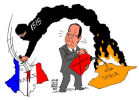 This happened last night: At least 120 dead in Paris attacks, Hollande declares emergency
This happened last night: At least 120 dead in Paris attacks, Hollande declares emergency
Gunmen and bombers attacked restaurants, a concert hall and a sports stadium at locations across Paris on Friday, killing at least 120 people in a deadly rampage that a shaken President Francois Hollande called an unprecedented terrorist attack.
The Islamic State claims responsibility (English version) for the attack.
But who weaponized and financed the Islamic State or prior organizations in Syria and Iraq from which this terror attack grew? Is this cartoon justified?
 Cartoon of the day by Carlos Latuff
Cartoon of the day by Carlos Latuff
Consider:
In 2012 - Hollande admits arming Syrian rebels in breach of embargo - book
The French president has admitted delivering weapons to the Syrian rebels during a period of EU embargo, a new book about to be published in France reveals.
The deliveries took place in 2012, before the embargo was canceled in May 2013, according to François Hollande's last year interview with journalist and writer Xavier Panon. "We began when we were certain they would end up in the right hands. For the lethal weapons it was our services who delivered them," Hollande told the writer, ...
Okt 2012 - Rebel Arms Flow Is Said to Benefit Jihadists in Syria
WASHINGTON — Most of the arms shipped at the behest of Saudi Arabia and Qatar to supply Syrian rebel groups fighting the government of Bashar al-Assad are going to hard-line Islamic jihadists, and not the more secular opposition groups that the West wants to bolster, according to American officials and Middle Eastern diplomats.
Dec 2012 - France funding Syrian rebels in new push to oust Assad
France has emerged as the most prominent backer of Syria's armed opposition and is now directly funding rebel groups around Aleppo as part of a new push to oust the embattled Assad regime.
Large sums of cash have been delivered by French government proxies across the Turkish border to rebel commanders in the past month, diplomatic sources have confirmed. The money has been used to buy weapons inside Syria and to fund armed operations against loyalist forces.
Aug 2014 - France delivered arms to Syrian rebels, Hollande confirms
President Francois Hollande said on Thursday that France had delivered weapons to rebels battling the Syrian regime of Bashar al-Assad “a few months ago.”
Murad Gazdiev @MuradoRT
French APILAS rocket launcher supplied to #syria rebels fall into hands of #ISIS. Pics from #Deraa, Southern #Syria
12:09 PM - 6 Nov 2015


Jun 2014 - 'Thank God for the Saudis': ISIS, Iraq, and the Lessons of Blowback
[T]wo of the most successful factions fighting Assad’s forces are Islamist extremist groups: Jabhat al-Nusra and the Islamic State of Iraq and Syria (ISIS), the latter of which is now amassing territory in Iraq and threatening to further destabilize the entire region. And that success is in part due to the support they have received from two Persian Gulf countries: Qatar and Saudi Arabia.
Qatar’s military and economic largesse has made its way to Jabhat al-Nusra, to the point that a senior Qatari official told me he can identify al-Nusra commanders by the blocks they control in various Syrian cities. But ISIS is another matter. As one senior Qatari official stated, “ISIS has been a Saudi project.”
France benefited from its support for the U.S.-Wahhabi regime change project in Syria and Iraq by getting huge orders for military equipment from the medieval Wahhabi regimes:
Apr 2015 - France and Qatar seal $7 billion Rafale fighter jet deal
Qatar has agreed to buy 24 Dassault Aviation-built Rafale fighter jets in a 6.3-billion-euro (4.55 billion pounds) deal, the French government said on Thursday, as the Gulf Arab state looks to boost its military firepower in an increasingly unstable region.
June 2015 - Saudi Arabia and France ink $12bln deal
Saudi Arabia and France agreed Wednesday to sign $12 billion of deals, Saudi Foreign Minister Adel Al-Jubair said during a landmark visit by Deputy Crown Prince Mohammed bin Salman to Paris.
Even after it became obvious for everyone that the regime change project in Syria has led to an expansion of terrorism Hollande was still demanding the end of the Syrian state.
Sept 2015 - François Hollande of France Says Assad Must Go
President François Hollande of France told the United Nations General Assembly on Monday that his country would “shoulder its responsibilities” in global efforts to end the fighting in Syria, but that the conflict could be resolved only if President Bashar al-Assad was removed from power.
Can Hollande now change his tune?
Posted by b on November 14, 2015 at 01:46 AM | Permalink
Interview with President Bashar al-Assad: 'If you are worried about refugees, stop supporting terrorists'
Update, 1:55AM, 17 Sep : The full transcript is now also included. Update, 3:30PM, 16 Sep : The full 40:19 minute interview can now be watched in ‘West crying for refugees with one eye, aiming gun with the other’ – Assad (FULL INTERVIEW) (16/9/15) | RT. A full transcript of the interview is included in the article.
Previously published (15/9/15) on RT. Now also republished (16/9/15) on the Free Syrian Press and republished (in part) on Al-Manar. Watch the full version of the interview with President Bashar al-Assad on RT.com live at 03:00 GMT today on 16 September (1:00PM in Australia's East or 11:00PM in WA).
"If we ask any Syrian today about what they want, the first thing they would say - 'We want security and safety for every person and every family'," the Syrian president said, adding that political forces, whether inside or outside the government "should unite around what the Syrian people want."
The "Syrian fabric," as Assad has called it, includes people of many ethnicities and sects, including the Kurds. "They are not foreigners," the Syrian president said, adding that without such groups of people who have been living in the region for centuries "there wouldn't have been a homogeneous Syria."
Assad said that the dialogue in Syria should be continued "in order to reach the consensus," which cannot be implemented "unless we defeat the terrorism in Syria."
"If you want to implement anything real, it's impossible to do anything while you have people being killed, bloodletting hasn't stopped, people feel insecure," the Syrian president said.
"I would like to take this opportunity to call on all forces to unite against terrorism, because it is the way to achieve the political objectives which we, as Syrians, want through dialogue and political action," Bashar Assad said.
Read and watch the full version of the interview with President Bashar al-Assad interview on RT.com Live at 03:00 GMT (or 1:00PM 16 September in Australia's East or 11:00PM in Western Australia) on 16 September.
Read and watch the full version of the interview with President Bashar al-Assad interview on RT.com Live at 03:00 GMT (or 1:00PM 16 September in Australia's East or 11:00PM in Western Australia) on 16 September.
Full transcript
Question 1: Mr. President, thank you from the Russian media, from RT, from Rossiyskaya Gazeta, Channel 1, Russia 24, RIA Novosti, and NTV channel, for giving us all the opportunity to talk to you during this very critical phase of the crisis in Syria, where there are many questions that need to be addressed on where exactly the political process to achieve peace in Syria is heading, what's the latest developments on the fight against ISIL, and the status of the Russian and Syrian partnership, and of course the enormous exodus of Syrian refugees that has been dominating headlines in Europe.
Now, the crisis in Syria is entering its fifth year. You have defied all predictions by Western leaders that you would be ousted imminently, and continue to serve today as the President of the Syrian Arab Republic. Now, there has been a lot of speculation recently caused by reports that officials from your government met with officials from your adversary Saudi Arabia that caused speculation that the political process in Syria has entered a new phase, but then statements from Saudi Arabia that continue to insist on your departure suggest that in fact very little has changed despite the grave threat that groups like ISIL pose far beyond Syria's borders.
So, what is your position on the political process? How do you feel about power sharing and working with those groups in the opposition that continue to say publically that there can be no political solution in Syria unless that includes your immediate departure? Have they sent you any signal that they are willing to team up with you and your government? In addition to that, since the beginning of the crisis in Syria, many of those groups were calling to you to carry out reforms and political change. But is such change even possible now under the current circumstances with the war and the ongoing spread of terror in Syria?
President Assad: Let me first divide this question. It's a multi question in one question. The first part regarding the political process, since the beginning of the crisis we adopted the dialogue approach, and there were many rounds of dialogue between Syrians in Syria, in Moscow, and in Geneva. Actually, the only step that has been made or achieved was in Moscow 2, not in Geneva, not in Moscow 1, and actually it's a partial step, it's not a full step, and that's natural because it's a big crisis. You cannot achieve solutions in a few hours or a few days. It's a step forward, and we are waiting for Moscow 3. I think we need to continue the dialogue between the Syrian entities, political entities or political currents, in parallel with fighting terrorism in order to achieve or reach a consensus about the future of Syria. So, that's what we have to continue.
If I jump to the last part, because it's related to this one, is it possible to achieve anything taking into consideration the prevalence of terrorism in Syria and in Iraq and in the region in general? We have to continue dialogue in order to reach the consensus as I said, but if you want to implement anything real, it's impossible to do anything while you have people being killed, bloodletting hasn't stopped, people feel insecure. Let's say we sit together as Syrian political parties or powers and achieve a consensus regarding something in politics, in economy, in education, in health, in everything. How can we implement it if the priority of every single Syrian citizen is to be secure? So, we can achieve consensus, but we cannot implement unless we defeat the terrorism in Syria. We have to defeat terrorism, not only ISIS.
I'm talking about terrorism, because you have many organizations, mainly ISIS and al-Nusra that were announced as terrorist groups by the Security Council. So, this is regarding the political process. Sharing power, of course we already shared it with some part of the opposition that accepted to share it with us. A few years ago they joined the government. Although sharing power is related to the constitution, to the elections, mainly parliamentary elections, and of course representation of the Syrian people by those powers. But in spite of that, because of the crisis, we said let's share it now, let's do something, a step forward, no matter how effective.
Regarding the refugee crisis, I will say now that Western dealing in the Western propaganda recently, mainly during the last week, regardless of the accusation that those refugees are fleeing the Syrian government, but they call it regime, of course. Actually, it's like the West now is crying for the refugees with one eye and aiming at them with a machinegun with the second one, because actually those refugees left Syria because of the terrorism, mainly because of the terrorists and because of the killing, and second because of the results of terrorism. When you have terrorism, and you have the destruction of the infrastructure, you won't have the basic needs of living, so many people leave because of the terrorism and because they want to earn their living somewhere in this world.
So, the West is crying for them, and the West is supporting terrorists since the beginning of the crisis when it said that this was a peaceful uprising, when they said later it's moderate opposition, and now they say there is terrorism like al-Nusra and ISIS, but because of the Syrian state or the Syrian regime or the Syrian president. So, as long as they follow this propaganda, they will have more refugees. So, it's not about that Europe didn't accept them or embrace them as refugees, it's about not dealing with the cause. If you are worried about them, stop supporting terrorists. That's what we think regarding the crisis. This is the core of the whole issue of refugees.
Question 2: Mr. President, you touched on the subject of the internal Syrian opposition in your first answer; nevertheless, I would like to go back to that because it's very important for Russia. What should the internal opposition do in order to cooperate and coordinate with Syrian authorities to support them in battle… which is what they say they intend to do? How do you see the prospects for the Moscow-3 and Geneva-3 conferences? Will they be useful to Syria in the current situation?
President Assad: As you know, we are at war with terrorism, and this terrorism is supported by foreign powers. It means that we are in a state of complete war. I believe that any society and any patriotic individuals, and any parties which truly belong to the people should unite when there is a war against an enemy; whether that enemy is in the form of domestic terrorism or foreign terrorism. If we ask any Syrian today about what they want, the first thing they would say is: we want security and safety for every person and every family.
So we, as political forces, whether inside or outside the government, should unite around what the Syrian people want. That means we should first unite against terrorism. That is logical and self-evident. That's why I say that we have to unite now as political forces, or government, or as armed groups which fought against the government, in order to fight terrorism. This has actually happened.
There are forces fighting terrorism now alongside the Syrian state, which had previously fought against the Syrian state. We have made progress in this regard, but I would like to take this opportunity to call on all forces to unite against terrorism, because it is the way to achieve the political objectives which we, as Syrians, want through dialogue and political action.
Intervention: Concerning the Moscow-3 and Geneva-3 conferences; in your opinion, are there good prospects for them?
President Assad: The importance of Moscow-3 lies in the fact that it paves the way to Geneva-3, because the international sponsorship in Geneva was not neutral, while the Russian sponsorship is. It is not biased, and is based on international law and Security Council resolutions. Second, there are substantial differences around the ‘transitional body' item in Geneva. Moscow-3 is required to solve these problems between the different Syrian parties; and when we reach Geneva-3, it is ensured that there is a Syrian consensus which would enable it to succeed. We believe that it is difficult for Geneva-3 to succeed unless Moscow-3 does. That's why we support holding this round of negotiations in Moscow after preparations for the success of this round have been completed, particularly by the Russian officials.
Question 3: I would like to continue with the issue of international cooperation in order to solve the Syrian crisis. It's clear that Iran, since solving the nuclear issue, will play a more active role in regional affairs. How would you evaluate recent Iranian initiatives on reaching a settlement for the situation in Syria? And, in general, what is the importance of Tehran's support for you? Is there military support? And, if so, what form does it take?
President Assad: At present, there is no Iranian initiative. There are ideas or principles for an Iranian initiative based primarily on Syria's sovereignty, the decisions of the Syrian people and on fighting terrorism. The relationship between Syria and Iran is an old one. It is over three-and-a-half decades old. There is an alliance based on a great degree of trust. That's why we believe that the Iranian role is important. Iran supports Syria and the Syrian people. It stands with the Syrian state politically, economically and militarily. When we say militarily, it doesn't mean - as claimed by some in the Western media - that Iran has sent an army or armed forces to Syria. That is not true. It sends us military equipment, and of course there is an exchange of military experts between Syria and Iran. This has always been the case, and it is natural for this cooperation to grow between the two countries in a state of war. Yes, Iranian support has been essential to support Syria in its steadfastness in this difficult and ferocious war.
Question 4: Concerning regional factors and proponents, you recently talked about security coordination with Cairo in fighting terrorism, and that you are in the same battle line in this regard. How is your relationship with Cairo today given that it hosts some opposition groups? Do you have a direct relationship, or perhaps through the Russian mediator, particularly in light of the strategic relations between Russia and Egypt. President Sisi has become a welcome guest in Moscow today.
President Assad: Relations between Syria and Egypt have not ceased to exist even over the past few years, and even when the president was Mohammed Morsi, who is a member of the terrorist Muslim Brotherhood organisation. Egyptian institutions insisted on maintaining a certain element of this relationship. First, because the Egyptian people are fully aware of what is happening in Syria, and second because the battle we are fighting is practically against the same enemy. This has now become clearer to everyone. Terrorism has spread in Libya, Egypt, Yemen, Syria, Iraq, in other Arab countries, and in some Muslim countries like Afghanistan, Pakistan and others. That's why I can say that there is joint vision between us and the Egyptians; but our relationship exists now on a security level. There are no political relations. I mean, there are no contacts between the Syrian Foreign Ministry and the Egyptian Foreign Ministry, for instance. Contacts are done on a security level only. We understand the pressures that might be applied on Egypt or on both Syria and Egypt so that they don't have a strong relationship. This relationship does not go, of course, through Moscow. As I said, this relationship has never ceased to exist, but we feel comfortable about improving relations between Russia and Egypt. At the same time, there is a good, strong and historical relation between Moscow and Damascus, so it is natural for Russia to feel comfortable for any positive development in relations between Syria and Egypt.
Question 5: Mr. President, allow me to go back to the question of fighting terrorism. How do you look at the idea of creating a region free of ISIS terrorists in the north of the country on the border with Turkey? In that context, what do you say about the indirect cooperation between the West and terrorist organizations like the al-Nusra Front and other extremist groups? And with whom are you willing to cooperate and fight against ISIS terrorists?
President Assad: To say that the border with Turkey should be free of terrorism means that terrorism is allowed in other regions. That is unacceptable. Terrorism should be eradicated everywhere; and we have been calling for three decades for an international coalition to fight terrorism. But as for Western cooperation with the al-Nusra Front, this is reality, because we know that Turkey supports al-Nusra and ISIS by providing them with arms, money and terrorist volunteers. And it is well-known that Turkey has close relations with the West. Erdogan and Davutoglu cannot make a single move without coordinating first with the United States and other Western countries. Al-Nusra and ISIS operate with such a force in the region under Western cover, because Western states have always believed that terrorism is a card they can pull from their pocket and use from time to time. Now, they want to use al-Nusra just against ISIS, maybe because ISIS is out of control one way or another. But that doesn't mean they want to eradicate ISIS. Had they wanted to do so, they would have been able to do that. For us, ISIS, al-Nusra, and all similar organizations which carry weapons and kill civilians are extremist organizations.
But who we conduct dialogue with is a very important question. From the start we said that we engage in dialogue with any party, if that dialogue leads to degrading terrorism and consequently achieve stability. This naturally includes the political powers, but there are also armed groups with whom we conducted dialogue and reached agreement in troubled areas which have become quiet now. In other areas, these armed groups joined the Syrian Army and are fighting by its side, and some of their members became martyrs. So we talk to everyone except organizations I mentioned like ISIS, al-Nusra, and other similar ones for the simple reason that these organizations base their doctrine on terrorism. They are ideological organizations and are not simply opposed to the state, as is the case with a number of armed groups. Their doctrine is based on terrorism, and consequently dialogue with such organizations cannot lead to any real result. We should fight and eradicate them completely and talking to them is absolutely futile.
Intervention: When talking about regional partners, with whom are you prepared to cooperate in fighting terrorism?
President Assad: Certainly with friendly countries, particularly Russia and Iran. Also we are cooperating with Iraq because it faces the same type of terrorism. As for other countries, we have no veto on any country provided that it has the will to fight terrorism and not as they are doing in what is called “the international coalition” led by the United States. In fact, since this coalition started to operate, ISIS has been expanding. In other words, the coalition has failed and has no real impact on the ground. At the same time, countries like Turkey, Qatar, Saudi Arabia, and Western countries which provide cover for terrorism like France, the United States, or others, cannot fight terrorism. You cannot be with and against terrorism at the same time. But if these countries decide to change their policies and realize that terrorism is like a scorpion, if you put it in your pocket, it will sting you. If that happens, we have no objection to cooperating with all these countries, provided it is a real and not a fake coalition to fight terrorism.
Question 6: What is the Syrian army's current condition? They've been fighting for over four years. Are they exhausted by the war, or become stronger as a result of engagement in military operations? And are there reserve forces to support them? I also have another important question: you said a large number of former adversaries have moved to your side and are fighting within the ranks of government forces. How many? And what is the extent of their help in the fight against extremist groups?
President Assad: Of course, war is bad. And any war is destructive, any war weakens any society and any army, no matter how strong or rich a country is. But things cannot be assessed this way. War is supposed to unite society against the enemy. The army becomes the most-important symbol for any society when there is aggression against the country. Society embraces the army, and provides it with all the necessary support, including human resources, volunteers, conscripts, in order to defend the homeland. At the same time, war provides a great deal of expertise to any armed forces practically and militarily. So, there are always positive and negative aspects. We cannot say that the army becomes weaker or stronger. But in return, this social embrace and support for the army provides it with volunteers. So, in answer to your question ‘are there reserves?'… yes, certainly, for without such reserves, the army wouldn't have been able to stand for four-and-a-half years in a very tough war, particularly since the enemy we fight today has an unlimited supply of people. We have terrorist fighters from over 80 or 90 countries today, so our enemy is enjoying enormous support in various countries, from where people come here to fight alongside the terrorists. As for the army, it's almost exclusively made of Syrians. So, we have reserve forces, and this is what enables us to carry on. There is also determination. We have reserves not only in terms of human power, but in will as well. We are more determined than ever before to fight and defend our country against terrorists. This is what led some fighters who used to fight against the state at the beginning for varying reasons, discovered they were wrong and decided to join the state. Now they are fighting battles along with the army, and some have actually joined as regular soldiers. Some have kept their weapons, but they are fighting in groups alongside the armed forces in different parts of Syria.
Question 7: Mr. President, Russia has been fighting terrorism for 20 years, and we have seen its different manifestations. It now seems you are fighting it head on. In general, the world is witnessing a new form of terrorism. In the regions occupied by ISIS, they are setting up courts and administrations, and there are reports that it intends to mint its own currency. They are constructing what looks like a state. This in itself might attract new supporters from different countries. Can you explain to us whom are you fighting? Is it a large group of terrorists or is it a new state which intends to radically redraw regional and global borders? What is ISIS today?
President Assad: Of course, the terrorist ISIS groups tried to give the semblance of a state, as you said, in order to attract more volunteers who live on the dreams of the past: that there was an Islamic state acting for the sake of religion. That ideal is unreal. It is deceptive. But no state can suddenly bring a new form to any society. The state should be the product of its society. It should be the natural evolution of that society, to express it. In the end, a state should be a projection of its society. You cannot bring about a state which has a different form and implant it in a society. Here we ask the question: does ISIS, or what they call ‘Islamic State', have any semblance to Syrian society? Certainly not.
Of course we have terrorist groups, but they are not an expression of society. In Russia, you have terrorist groups today, but they do not project Russian society, nor do they have any semblance to the open and diverse Russian society. That's why if they tried to mint a currency or have stamps or passports, or have all these forms which indicate the existence of a state, it doesn't mean they actually exist as a state; first because they are different from the people and, second, because people in those regions flee towards the real state, the Syrian state, the national state. Sometimes they fight them too. A very small minority believes these lies. They are certainly not a state, they are a terrorist group. But if we want to ask about who they are, let's speak frankly: They are the third phase of the political or ideological poisons produced by the West, aimed at achieving political objectives. The first phase was the Muslim Brotherhood at the turn of the last century. The second phase was al-Qaeda in Afghanistan in order to fight the Soviet Union. And the third phase is ISIS, the al-Nusra Front and these groups. Who are ISIS? And who are these groups? They are simply extremist products of the West.
Question 8: Mr. President, at the beginning of the Syrian crisis, the Kurdish issue started to be discussed more often. Previously, Damascus was severely criticized because of its position towards the Kurdish minority. But now, practically, in some areas, Kurdish formations are your allies in the fight against ISIS. Do you have a specific position towards who the Kurds are to you and who you are to them?
President Assad: First, you cannot say there was a certain state policy concerning the Kurds. A state cannot discriminate between members of its population; otherwise, it creates division in the country. If we had been discriminating between different components of society, the majority of these components wouldn't have supported the state now, and the country would have disintegrated from the very beginning. For us, the Kurds are part of the Syrian fabric. They are not foreigners - they live in this region like the Arabs, Circassians, Armenians and many other ethnicities and sects who've been living in Syria for many centuries. It's not known when some of them came to this region. Without these groups, there wouldn't have been a homogenous Syria. So, are they our allies today? No, they are patriotic people. But on the other hand, you cannot put all the Kurds in one category. Like any other Syrian component, there are different currents among them. They belong to different parties. There are those on the left and those on the right. There are tribes, and there are different groups. So, it is not objective to talk about the Kurds as one mass.
There are certain Kurdish demands expressed by some parties, but there are no Kurdish demands for the Kurds. There are Kurds who are integrated fully into society; and I would like to stress that they are not allies at this stage, as some people would like to show. I would like to stress that they are not just allies at this stage, as some suggest. There are many fallen Kurdish soldiers who fought with the army, which means they are an integral part of society. But there are parties which had certain demands, and we addressed some at the beginning of the crisis. There are other demands which have nothing to do with the state, and which the state cannot address. There are things which would relate to the entire population, to the constitution, and the people should endorse these demands before a decision can be taken by the state. In any case, anything proposed should be in the national framework. That's why I say that we are with the Kurds, and with other components, all of us in alliance to fight terrorism.
This is what I talked about a while ago: that we should unite in order to fight ISIS. After we defeat ISIS, al-Nusra and the terrorists, the Kurdish demands expressed by certain parties can be discussed nationally. There's no problem with that, we do not have a veto on any demand as long as it is within the framework of Syria's unity and the unity of the Syrian people and territory, fighting terrorism, Syrian diversity, and the freedom of this diversity in its ethnic, national, sectarian, and religious sense.
Question 9: Mr. President, you partially answered this question, but I would like a more-precise answer, because some Kurdish forces in Syria call for amending the constitution. For instance, setting up a local administration and moving towards autonomy in the north. These statements are becoming more frequent now that the Kurds are fighting ISIS with a certain degree of success. Do you agree with such statements that the Kurds can bet on some kind of gratitude? Is it up for discussion?
President Assad: When we defend our country, we do not ask people to thank us. It is our natural duty to defend our country. If they deserve thanks, then every Syrian citizen defending their country deserves as much. But I believe that defending one's country is a duty, and when you carry out your duty, you don't need thanks. But what you have said is related to the Syrian constitution. Today, if you want to change the existing structure in your country, in Russia for instance, let's say to redraw the borders of the republics, or give one republic powers different to those given to other republics - this has nothing to do with the president or the government. This has to do with the constitution.
The president does not own the constitution and the government does not own the constitution. Only the people own the constitution, and consequently changing the constitution means national dialogue. For us, we don't have a problem with any demand. As a state, we do not have any objection to these issues as long as they do not infringe upon Syria's unity and diversity and the freedom of its citizens.
But if there are certain groups or sections in Syria which have certain demands, these demands should be in the national framework, and in dialogue with the Syrian political forces. When the Syrian people agree on taking steps of this kind, which have to do with federalism, autonomy, decentralization or changing the whole political system, this needs to be agreed upon by the Syrian people, and consequently amending the constitution. This is why these groups need to convince the Syrian people of their proposals. In that respect, they are not in dialogue with the state, but rather with the people. When the Syrian people decide to move in a certain direction, and to approve a certain step, we will naturally approve it.
Question 10: Now, the U.S.-led coalition has been carrying out airstrikes on Syrian territory for about one year on the same areas that the Syrian Air Force is also striking ISIL targets, yet there hasn't been a single incident of the U.S.-led coalition and the Syrian Air Force activity clashing with one another. Is there any direct or indirect coordination between your government and the U.S. coalition in the fight against ISIL?
President Assad: You'd be surprised if I say no. I can tell you that my answer will be not realistic, to say now, while we are fighting the same, let's say enemy, while we're attacking the same target in the same area without any coordination and at the same time without any conflict. And actually this is strange, but this is reality. There's not a single coordination or contact between the Syrian government and the United States government or between the Syrian army and the U.S. army. This is because they cannot confess, they cannot accept the reality that we are the only power fighting ISIS on the ground. For them, maybe, if they deal or cooperate with the Syrian Army, this is like a recognition of our effectiveness in fighting ISIS. This is part of the willful blindness of the U.S. administration, unfortunately.
Question 11: So not event indirectly though, for example the Kurds? Because we know the U.S. is working with the Kurds, and the Kurds have some contacts with the Syrian government. So, not even any indirect coordination?
President Assad: Not even any third party, including the Iraqis, because before they started the attacks, they let us know through the Iraqis. Since then, not a single message or contact through any other party.
Question 12: Ok, so just a little bit further than that. You've lived in the West, and you, at one time, moved in some of those circles with some Western leaders that since the beginning of the crisis have been backing armed groups who are fighting to see you overthrown. How do you feel about one day working again with those very same Western leaders, perhaps shaking hands with them? Would you ever be able to trust them again?
President Assad: First, it's not a personal relation; it's a relation between states, and when you talk about relation between states, you don't talk about trust; you talk about mechanism. So, trust is a very personal thing you cannot depend on in political relations between, let's say, people. I mean, you are responsible for, for example in Syria, for 23 million, and let's say in another country for tens of millions. You cannot put the fate of those tens of millions or maybe hundreds of millions on the trust of a single person, or two persons in two countries. So, there must be a mechanism. When you have a mechanism, you can talk about trust in a different way, not a personal way. This is first.
Second, the main mission of any politician, or any government, president, prime minister, it doesn't matter, is to work for the interest of his people and the interest of his country. If any meeting or any handshaking with anyone in the world will bring benefit to the Syrian people, I have to do it, whether I like it or not. So, it's not about me, I accept it or I like it or whatever; it's about what the added value of this step that you're going to take. So yes, we are ready whenever there's the interest of the Syrians. I will do it, whatever it is.
Question 13: Regarding alliances in the fight against terrorism and ISIS, President Putin called for a regional alliance to fight the so-called ‘Islamic State'; and the recent visits of Arab officials to Moscow fall into that context, but Syrian Foreign Minister Walid al-Moallem said that would need a miracle. We are talking here about security coordination, as described by Damascus, with the governments of Jordan, Turkey and Saudi Arabia. How do you envisage that alliance? Will it achieve any results, in your opinion? You said that any relationship is based on interests, so are you willing to coordinate with these countries, and what is the truth behind the meetings held between Syrian, and maybe Saudi, officials as reported by the media?
President Assad: As for fighting terrorism, this is a big and comprehensive issue which includes cultural and economic aspects. It obviously has security and military aspects as well. In terms of prevention, all the other aspects are more important than the security and military ones, but today, in the reality we now live in terms of fighting terrorism, we are not facing terrorist groups, we are facing terrorist armies equipped with light, medium and heavy weaponry. They have billions of dollars to recruit volunteers. The military and security aspects should be given priority at this stage. So, we think this alliance should act in different areas, but to fight on the ground first. Naturally, this alliance should consist of states which believe in fighting terrorism and believe that their natural position should be against terrorism.
In the current state of affairs, the person supporting terrorism cannot be the same person fighting terrorism. This is what these states are doing now. Saudi Arabia, Turkey and Jordan, who pretend to be part of a coalition against terrorism in northern Syria, actually support terrorism in the south, the north and the north-west, virtually in the same regions in which they are supposed to be fighting terrorism. Once again I say that, within the framework of public interest, if these states decide to go back to the right position, to return to their senses and fight terrorism, naturally we will accept and cooperate with them and with others. We do not have a veto and we do not stick to the past. Politics change all the time. It might change from bad to good, and the ally might become an adversary, and the adversary an ally. This is normal. When they fight against terrorism, we will cooperate with them.
Question 14: Mr. President, there is a huge wave of refugees, largely from Syria, going to Europe. Some say these people are practically lost to Syria. They are deeply unhappy with the Syrian authorities because they haven't been able to protect them and they've had to leave their homes. How do you view those people? Do you see them as part of the Syrian electorate in the future? Do you expect them to return? And the second question has to do with the European sense of guilt about the displacement happening now. Do you think that Europe should feel guilty?
President Assad: Any person who leaves Syria constitutes a loss to the homeland, to be sure, regardless of the position or capabilities of that person. This, of course, does not include terrorists. It includes all citizens in general with the exception of terrorists. So, yes, there is a great loss as a result of emigration. You raised a question on elections. Last year, we had a presidential election in Syria, and there were many refugees in different countries, particularly in Lebanon. According to Western propaganda, they had fled the state, the oppression of the state and the killing of the state, and they are supposed to be enemies of the state. But the surprise for Westerners was that most of them voted for the president who is supposed to be killing them. That was a great blow to Western propaganda. Of course, voting has certain conditions. There should be an embassy, and to have the custodianship of the Syrian state in the voting process. That depends on relations between the states. Many countries have severed relations with Syria and closed Syrian embassies, and consequently Syrian citizens cannot vote in those countries. They have to go to other countries where ballot boxes are installed, and that did happen last year.
As for Europe, of course it's guilty. Today, Europe is trying to say that Europe feels guilty because it hasn't given money or hasn't allowed these people to immigrate legally, and that's why they came across the sea and drowned. We are sad for every innocent victim, but is the victim who drowns in the sea dearer to us than the victim killed in Syria? Are they dearer than innocent people whose heads are cut off by terrorists? Can you feel sad for a child's death in the sea and not for thousands of children who have been killed by the terrorists in Syria? And also for men, women, and the elderly? These European double standards are no longer acceptable. They have been flagrantly exposed. It doesn't make sense to feel sad for the death of certain people and not for deaths of others. The principles are the same. So Europe is responsible because it supported terrorism, as I said a short while ago, and is still supporting terrorism and providing cover for them. It still calls them ‘moderate' and categorizes them into groups, even though all these groups in Syria are extremists.
Question 15: If you don't mind, I would like to go back to the question about Syria's political future. Mr. President, your opponents, whether fighting against the authorities with weapons or your political opponents, still insist that one of the most-important conditions for peace is your departure from political life and as president. What do you think about that - as president and as a Syrian citizen? Are you theoretically prepared for that if you feel it's necessary?
President Assad: In addition to what you say, Western propaganda has, from the very beginning, been about the cause of the problem being the president. Why? Because they want to portray the whole problem in Syria lies in one individual; and consequently the natural reaction for many people is that, if the problem lies in one individual, that individual should not be more important than the entire homeland. So let that individual go and things will be alright. That's how they oversimplify things in the West. What's happening in Syria, in this regard, is similar to what happened in your case. Notice what happened in the Western media since the coup in Ukraine. What happened? President Putin was transformed from a friend of the West to a foe and, yet again, he was characterized as a tsar. He is portrayed as a dictator suppressing opposition in Russia, and that he came to power through undemocratic means, despite the fact that he was elected in democratic elections, and the West itself acknowledged that the elections were democratic. Now, it is no longer democratic. This is Western propaganda. They say that if the president went things will get better. What does that mean, practically? For the West, it means that as long as you are there, we will continue to support terrorism, because the Western principle followed now in Syria and Russia and other countries is changing presidents, changing states, or what they call bringing regimes down. Why? Because they do not accept partners and do not accept independent states. What is their problem with Russia? What is their problem with Syria? What is their problem with Iran? They are all independent countries. They want a certain individual to go and be replaced by someone who acts in their interests and not in the interest of his country. For us, the president comes through the people and through elections and, if he goes, he goes through the people. He doesn't go as a result of an American decision, a Security Council decision, the Geneva conference or the Geneva communiqué. If the people want him to stay, he should stay; and if the people reject him, he should leave immediately. This is the principle according to which I look at this issue.
Question 16: Military operations have been ongoing for more than four years. It's likely that you analyze things and review matters often. In your opinion, was there a crucial juncture when you realized war was unavoidable? And who initiated that war machinery? The influence of Washington or your Middle East neighbours? Or were there mistakes on your part? Are there things you regret? And if you had the opportunity to go back, would you change them?
President Assad: In every state, there are mistakes, and mistakes might be made every day, but these mistakes do not constitute a crucial juncture because they are always there. So what is it that makes these mistakes suddenly lead to the situation we are living in Syria today? It doesn't make sense. You might be surprised if I tell that the crucial juncture in what happened in Syria is something that many people wouldn't even think of. It was the Iraq war in 2003, when the United States invaded Iraq. We were strongly opposed to that invasion, because we knew that things were moving in the direction of dividing societies and creating unrest. And we are Iraq's neighbours. At that time, we saw that the war would turn Iraq into a sectarian country; into a society divided against itself. To the west of Syria there is another sectarian country - Lebanon. We are in the middle. We knew well that we would be affected. Consequently, the beginning of the Syrian crisis, or what happened in the beginning, was the natural result of that war and the sectarian situation in Iraq, part of which moved to Syria, and it was easy for them to incite some Syrian groups on sectarian grounds.
The second point, which might be less crucial, is that when the West adopted terrorism officially in Afghanistan in the early 1980s and called terrorists at that time ‘freedom fighters', and then in 2006 when Islamic State appeared in Iraq under American sponsorship and they didn't fight it. All these things together created the conditions for the unrest with Western support and Gulf money, particularly form Qatar and Saudi Arabia, and with Turkish logistic support, particularly since President Erdogan belongs intellectually to the Muslim Brotherhood. Consequently, he believes that, if the situation changed in Syria, Egypt, and Iraq, it means the creation of a new sultanate; not an Ottoman sultanate this time, but a sultanate for the Brotherhood extending from the Atlantic to the Mediterranean and ruled by Erdogan. All these factors together brought things to what we have today. Once again, I say that there were mistakes, and mistakes always create gaps and weak points, but they are not sufficient to cause that alone, and they do not justify what happened. And if these gaps and weak points are the cause, why didn't they lead to revolutions in the Gulf states - particularly in Saudi Arabia which doesn't know anything about democracy? The answer is self-evident, I believe.
Mr. President, thank you for giving us the time and for your detailed answers to our questions. We know that in September you have your golden jubilee, your 50th birthday. Probably the best wishes in the current circumstances would be the return of peace and safety to your country as soon as possible. Thank you.
Who is genuine about fighting terrorism in Syria - and who are the terrorists?
This article was previously published (24/8/15) on Russia Insider.
When George W Bush first declared the 'War on Terror' it seemed like just another of his 'mis-speaks' – surely he must have meant 'War on Terrorism'? But we didn't really bother because we knew it was neither, but just a label for wars of convenience on someone else's Terra. |
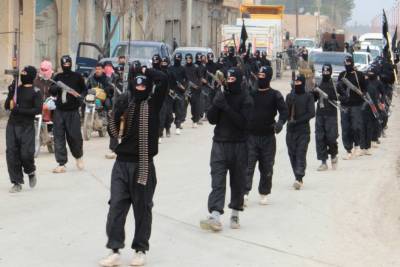
A tough sell for the US to claim it's serious
about fighting terrorism in Syria when it actually refuses to oppose Al Qaeda 1 (The footnote URL previously linked to the wrong page. Apologies - Ed) |
As these wars of opportunism fought by the United States to expand its interests and control pass their fourteenth year however, their supposed target has now grown to fit Bush's description, as legions of stereo-typical 'terrorists' rampage across America's foreign battlefields.
Perhaps it should be no surprise to find that this morphosis in the enemy has been accompanied by a change in how it is portrayed by the prosecutors of the war on terror and their client media.
Just as they pretended to be fighting terrorism in all those years when they were fighting for control of Iraq's oil fields, now they are pretending to fight against 'violent extremism' and 'radicalisation' at home, while justifying their ongoing campaign abroad as 'self-defence' – the 'Islamist death-cult' must be prevented from spreading beyond the boundaries of the chosen battlefields, and coming home to bite its trainers. (That campaign of course is little altered, though now rapidly expanding in scale to threaten the whole region, including Russia)
But there's another reason for this 'rebranding of the enemy' to sell it to the Western public – the countries who have to actually fight and die at the hands of this terrorist enemy are calling it by its real name, so the West can no longer use it without admitting that they share a common foe.
This has come into sharp focus in recent weeks with the launching by Russia of a bold initiative – putting together a group of states to fight the terrorist groups in Syria. It is a bold initiative because two of those states have been the main supporters of the Syrian insurgency, and must be convinced that it is in their own interests to change direction, as well as to abandon their quest to overthrow the Syrian government.
But Russia's initiative is no gambit, as it begins with one unyielding condition – that President Assad is going nowhere until stability is restored, when new free elections can decide if he will remain Syrians' choice of president.
The Russian joint counter-terrorism plan has another feature which distinguishes it from all the plans past and current of the self-declared 'international community' to 'fight terror' or to 'degrade and destroy Da'esh' – it is what it says, and doesn't conceal some hidden agenda.
And as far as Russia and Syria are concerned, this means fighting ALL the armed groups who are terrorising the inhabitants of villages and cities in Syria, regardless of their affiliation or alleged justification for taking up arms against the Syrian Arab Army.
Apart from calling the US coalition's bluff - that it is only protecting Syria and the world from Da'esh, this plan obviously directly targets groups that the US is not targeting, like 'Syria's Al Qaeda' – Jabhat al Nusra, or actually supporting, like the mythical 'Free Syrian Army' or its new 'Division 30'.
As far as the Syrian army and the people they are defending are concerned such labels are irrelevant and offensive – they simply want to see the end of this foreign-backed insurgency with the death or disarming of all its fighters.
Recently we heard from a friend who has returned to his home in Aleppo, and who has particularly acute observations to make of how it feels to be under constant threat of attack from terrorists, as they daily fire their home made gas-cylinder missiles to kill and terrorise residents of the government-secured section of the city.
Aleppo has also been suffering from a water shortage, as the insurgent groups have control of the supply from the Euphrates and only allow it to reach the rest of Aleppo via the Queiq river, into which they have dumped dead bodies and sewage. He describes how he feels:
"Those capable of dumping bread and clean water into a contaminated river to prevent half the city from eating the bread or having clean drinking water are committing heinous crimes against humanity.
I am not sure if it is a "war crime" as such but they are the real "infidels" if there is any real meaning for this word that they bandy about so liberally.
They are not "freedom fighters" or "moderates" that NATO and their allies are supporting so vociferously. We are suffering from lack of water, we go thirsty while they are intentionally squandering it.
I watch, heavy hearted, as the elderly and children patiently wait in endless queues in the searing heat to fill their assorted containers. I see them having to lug these heavy containers through the narrow alleyways, struggling under the weight as the precious water splashes into the dust beneath their feet.
I feel nothing but rage when I see these thugs and criminals on the other side of the city pouring thousands of litres of clean, fresh water into the disease infested river under the noses of the thirsty Syrians they are claiming to liberate.
They are the terrorists, they are the monsters in this story and they are committing daily mass crimes against the citizens of Aleppo, but this is never mentioned by the western media.
This is Aleppo, the real Aleppo, not the western media fantasy, this is our sleeping, waking, perpetual nightmare of life under terrorist occupation."
So what does the 'Coalition against ISIS' have to say about these terrorists targeting Syrians and their soldiers? It says: 'do what you like but don't target us'. And as Australia stands ready to expand its air force deployment over the border from Iraq following a US request, the danger to Australian forces from pursuit at the International Criminal Court seems to be the main consideration. For our friend in Aleppo such insufferable conceit would make Australia's likely contribution to Syria's suffering indistinguishable from all the rest.

Footnote[s]
1. ↑ The photo is of al-Nusra terrorists making a show of force in the Syrian town of Tell Abyad on 2 Jan 2014.
Syria demands UN deterrent measures against terrorists and their sponsors as attacks continue
See also: VoltaireNet | Western wars have killed four million Muslims since 1990 (11/4/15), Land Destroyer | Syria: America's Democratic Terrorists? (10/4/15), other related articles.
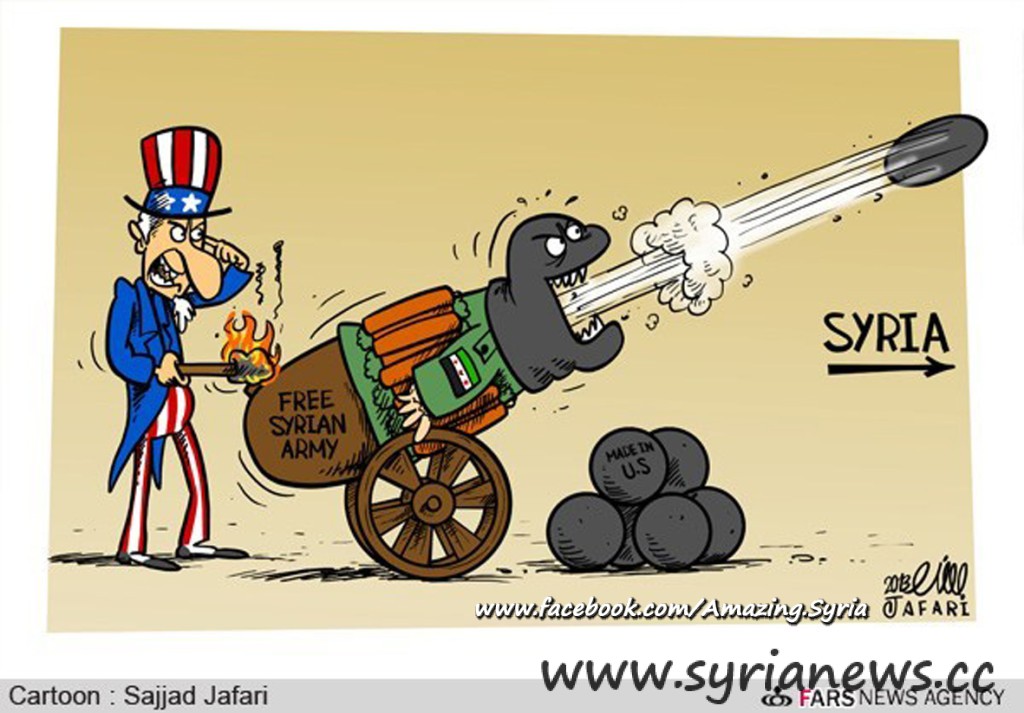 |
Those rightly outraged at the murder of Tori Johnson and the death of Katrina Dawson on 16 December at the end of the Martin Place siege and at the murder of 11 people on 7 January 2015 in Paris by terrorists (see embedded Syrian Girl video) should also contemplate the fact that, since March 2011, the people of Syria have suffered terrorism on a scale which is vastly greater than these two tragedies. Since March 2011, they have faced an invasion by hordes of foreign terrorists coming from almost every corner of the globe and not just the Arab world. These invaders have been paid for and supplied by the United States, its European allies and its allies amongst the Arab dictatorships including Saudi Arabia and Qatar. So far, over 200,000 Syrians have been killed at the hands of these terrorists. As a consequence, the Syrian government has demanded of the United Nations act against the terrorists' sponsors. |
The article below was previous published in SANA (12/4/15).
Damascus, SANA – Syria demanded deterrent measures by the United Nations against the terrorist organizations and the states backing and sponsoring them.
The Syrian demand was expressed in two identical letters which the Foreign and Expatriates Ministry addressed to Chairman of the UN Security Council and UN Secretary General on Sunday.
It was prompted by the bloody terrorist rocket attacks which hit Aleppo city yesterday, leaving heavy casualties of at least 19 civilians dead and scores of others wounded and causing massive material damage.
The new crime, the letters said, came as a response from the regimes of Saudi Arabia, Qatar, Turkey and Jordan to the "important" outcomes that were reached at the latest Moscow inter-Syrian talks.
In their "clear message" delivered by their agents of the so-called "moderate opposition", those regimes have sought to foil any political solution that could be reached by the Syrians themselves without foreign interference, the letters added.
The Foreign Ministry dismissed the claim of those and other countries of them sending "non-lethal" weapons to the terrorists, stressing that a new type of destructive weapons seemed to have been used in Aleppo attack.
Several four-story buildings were completely demolished, falling on their inhabitants’ heads, according to the letters.
The Ministry blamed the continuation of terrorist acts on those countries which have not ceased providing direct support to the Takfiri terrorist organizations, including the notorious Islamic State in Iraq and Syria (ISIS) and Jabhat al-Nusra, in addition to the so-called "Free Army", "Islam Army", "Islamic Front", "Liwa al-Fateh", "Ahrar al-Sham Movement", "Al-Ansar Front", etc.
Striking out at this continued support, the Ministry said the terrorist organizations would not have been capable of launching such bloody attacks, was it not for those countries shielding these organizations against punishment and continuing to supply them with weapons and explosives.
It named France, Britain, Jordan and the US as accomplices in backing the terrorists.
The Ministry demanded a Security Council non-politicized action towards enforcing counterterrorism resolutions in deeds not only in words.
The Security Council, it said, is also called upon to cooperate and coordinate with the Syrian government, which "has been combating terrorism for years on behalf of the entire world people."
The Syria government, the Ministry said, stresses dodged determination to continue fighting terrorism in Syria and defend its people by virtue of its constitutional responsibilities.
Haifa Said
Appendix 1: "The Charlie Hebdo Attacks Exposed" by the Syrian Girl
Appendix 2: Other related articles
Land Destroyer | Syria: America's Democratic Terrorists? (10/4/15), VoltaireNet | Western wars have killed four million Muslims since 1990 (11/4/15), Global Research | Syria at the UN: US, Britain, France, Jordan Refuse to Name ISIL as “Separate Terror Group" (11/4/15), Global Research | Syria: "Al-Qaeda Linked Rebels" Are Al-Qaeda (13/4/15), Global Research | Israel moves to Cover-up its alliance with al-Qaeda in Syria (14/4/15), PressTV | Turkey, Saudis to form anti-Syria military alliance: Report (14/4/15).
Syrian Fee Press | Israeli [occupation] army admits aiding al-Qaeda in Syria (12/4/15) – Asa Winstanley. Whilst informative it dismisses some 'conspiracy theories' about the Syrian conflict:
Popular conspiracy theories have it that al-Qaeda and the “Islamic State” (also known as DAESH, ISIS or ISIL) are Israeli- and/or US-intelligence creations.
Ash continues:
While there’s no evidence for that, it’s certainly true that the US-UK invasion of Iraq in 2003, and its consciously sectarian occupation regime of the country thereafter, created the conditions in which al-Qaeda in Iraq (later known as ISIS) was formed and thrived. Veteran journalist Patrick Cockburn demonstrates this most convincingly in his essential new book The Rise of Islamic State, which I have previously lauded here.
From my recent viewing of some of the articles about the Syria conflict to which Asa seems to be referring, a conspiracy by the United States and its allies to set up ISIS as a bogus extremist 'anti-west' army to undermine popular domestic opposition to war seems to be a highly plausible explanation of the recent course of events. However, having read these words by Asa Winstanley, I will have to re-examine these articles more closely.
Another irritating feature of this article and so much other material which otherwise seems to be strongly opposed to the United States' planned aggression against Syria, is its insistence on labeling of the Syrian government a 'regime' :
Hizballah (my spelling is 'Hezbollah' - Ed) and Iran, allies of the Bashar al-Assad regime, are aiding the government in Syria and fighting on the ground alongside Syrian army troops against al-Qaeda, the “Islamic State” and other Sunni rebel groups.
Could Asa be truly unaware that on 4 June 20914, Syrians overwhelmingly endorsed President Bashar al-Assad in presidential elections, as attested to by four International observers at a United Nations Press conference. See Global Research | Syria's press conference the United Nations doesn't want you to see (20/6/15) with embedded 52:45min video, republished on Candobetter.
Jeremy Bowen BBC interviews President Assad and what this has to do with Australia
The full text of the interview has been published by the Syrian Arab News Agency (SANA).
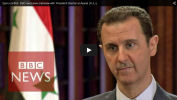
The interview inside between a BBC journalist, Jeremy Bowen BBC, and President Bashar al-Assad of Syria, is wonderfully calm, logical and informative despite the interviewer's many tendentious questions. Assad's analytical answers invite the viewer and journalist to logically evaluate reports which Australians are used to having presented emotively by anti-Assad forces. Assad's English syntax is sometimes unusual and the journalist at times fails to follow his statements and arguments. For instance, towards the end of the interview, Assad is asked if it is true that his government denied aid convoys access to areas held by the enemy. Assad's answer is that if they could stop aid convoys they would presumably be able to stop arms convoys. Since the areas are being bombed by 'rebels' continually, obviously they are unable to stop those arms. If his government were to stop any convoy, military interests would suggest it would be one bearing arms, not one bearing aid. Conversely, if the enemy fighters are able to import arms, then they should be able to import food. If so-called humanitarian organisations report that food is not arriving, but acknowledge that arms are, then the enemy is responsible for lack of food in a situation of well-armed violence.
Bashar al-Assad's performance seems so superior to that of Australian leaders that I could not help taking the comparison further.
Judging the Syrian leader by Australian leadership standards
During the Syrian conflicts President Bashar al-Assad has made himself available to journalists in a manner far freer than any Australian, US, British, French or German political leader. It is hard to imagine Australia's Prime Minster or its opposition leader being able to survive such a detailed interview about their conduct and policy rationale in Australia, say on democratic and humanitarian grounds. They simply are not morally, intellectually or educationally up to scratch and they expect journalists to stick to a narrow and predictable field.
The reader might exclaim that Australia is not currently in a condition of civil war and question the relevance of such comparisons. On the other hand, we are constantly told by the popular press that we are in danger of terrorist attacks. The much anticipated prospect of such attacks has been used to make fundamental changes to requirements of evidence, proof, right to know of what one is accused - requirements famed as having brought our legal system forward from medieval times. (See, for instance, "Action on inept anti-terror laws must get priority") So, if we are not at war, we are still treated as if we are in some kind of quasi-war state of emergency.
Why Syria is at war with terrorists and Australia only legislates against terrorism
Unlike the Syrian government, Australian politicians - government and opposition - toe the United States and NATO line, which many consider to be dictated by global financial institutions. (See, for instance, Sharon Beder, "Neoliberalism and the global financial crisis" (pdf)). This line is most unpopular amongst the general public who retain less and less of the available wealth or political power in this country, as suggested by high unemployment, housing unaffordability, foreign ownership deregulation, industrial conditions deregulation, privatisation and population growth engineering. Australia's farmers and its middle classes have lost almost all effective right to object to having their homes, livelihoods and environments torn up - by gas and coal-seam frackers and by state roads authorities and corporations to make way for state engineered population growth.[1]
So, what (apart from laws against secondary boycotts) keeps Australians from holding general strikes and standing up to their false leaders? Two things mainly:
1. Political disorganisation following on from social and geographical disorganisation carried out by successive governments and corporations, supported by a mainstream press and state press which have feudal-like tenure [2]
2. the well-known fact that people can now be arrested and detained without explanation in this country, a situation brought about by skilful use of the threat of terrorism to make us agree to the loss of our basic rights at law.[3]
In Syria, however, terrorism has been turned from isolated threats into brutal armies backed by the US-NATO alliance of which Australia and Saudi Arabia are both sort of client-states, and supported by aligned media propaganda. (See for instance, "Syria whom to support whom to trust?"
Here is a probable reason why Syria is at war on its own territory but Australia is not. Syria has or had until recently, a well-functioning dirigist economy and strong national identification by its people. Syrian law, based on French civil code and some local and sharia law supported this situation. The global financial forces do not like national solidarity. They don't like people's banks, free education and free hospital and medical care. If they cannot corrupt a state (as they appear to have done with Australia) they arm dissonant forces within it and send in mercenaries to back them up.
We have seen this in Libya, Iraq, Bahrain, Ukraine and Syria.
So, why isn't Australia torn by civil war? Because, despite the rising alarm of its people (whose current only option is to try to elect independents), Australia is doing the bidding of globalising finance, supporting illegal wars and turning its own polity into a feudal regime with a commodity economy overseen by foreign oligarchs and monarchs of a distinctly fascist outlook. Even our Prime Minister, Tony Abbott, has reinstituted knights and dames and recently even knighted British Prince Phillip in a move which, whilst decoratively redundant, could not go ignored and was probably not meant to.
Remember, Australia has no code of civil rights, subscribes to a bill of very vague 'human' rights,[4] and is sacrificing ordinary people's homes and farms to higher financial turnover uses - freeways for highrise rentals and quick and dirty coal mines and gas fracks.[5] The corporates and dynasties are taking over. Now we have a leader who takes knighthood seriously. The reaction is that he is ridiculous. But the reality is that he has formally, legally resurrected a major feudal institution, to bestow knighthoods on public figureheads of power. How far is Australia from a feudal state? What rights and obligations do knights have to the Australian PM and what obligations, if any, do Australians have towards them?
NOTES
[1] See, for instance, http://candobetter.net/taxonomy/term/3930
[2] See, for instance, ABC Bias; Murdoch media.
[3] http://www.abc.net.au/news/2014-09-20/new-powers-for-police-under-proposed-anti-terror-laws-amendments/5758178. Some would argue that our governments and the press that influences them got us into this mess by supporting illegal wars which have given rise to real acts of terrorism. http://candobetter.net/node/4257.
[4]Human rights.
[5] How corporate terrorism is dispossessing Oz farmers
Speaker on Jihadism at Pax Christi Victoria Peace Movement, Feb 15, East Malvern
Pax Christi Victoria Inc. International Christian Peace Movement invites you to the first Agape of 2015. Sunday February 15 at Kildara, rear 39 Stanhope Street, East Malvern. Shared meal 1 p.m Meeting 2 p.m-4.00 p.m. Speaker will be Noor Huda Ismail, from Central Java, Indonesia, the founder and director of a grass root NGO called Yayasan Prasasti Perdamaian (Institute for International Peace Building in Indonesia). He describes himself " a terrorist's whisperer". His
connection to jihadism world went back to his childhood where he studied for 6 six years with Bali bombers in a pesantren (an Islamic boarding school) in Central Java. One of the founders of the school is Abu Bakar Ba'asyir who is now incarcerated in Nusakambangan (Indonesia's Alcatraz prison) for his involvement in Aceh Military training Camp in 2010.
He will speak on : "The Emergence of Groups of Violence in Indonesia in the Name of Islam and the Effort of Civil Society in Indonesia to Peacefully Fight this Toxic Ideology.”
Please come and bring a friend.
Sunday February 15
at Kildara, rear 39 Stanhope Street, East Malvern.
Shared meal 1 p.m
Meeting 2 p.m-4.00 p.m
Bring food to share. All Welcome!
Biography of speaker
"Noor Huda Ismail describes himself " a terrorist's whisperer". His connection to jihadism world went back to his childhood where he studied for 6 six years with Bali bombers in a pesantren (an Islamic boarding school) in Central Java. One of the founders of the school is Abu Bakar Ba'asyir who is now incarcerated in Nusakambangan (Indonesia's Alcatraz prison) for his involvement in Aceh Military training Camp in 2010.
Noor Huda worked as a special correspondent for The Washington Post South East Asia Bureau from 2002-2005. He was assigned to cover the story of the Bali Bombings and its aftermath in 2002. He was so shocked when he found out that one of the perpetrators was his roommate during his Islamic boarding school years. This event became a turning point in his life.
The question why some of his friends turned to violence preoccupied him and changed the direction of his life. In 2005 he won the British's Council Scholarship to pursue a master degree in International Security at St Andrews University (a Jesuit-run University) in Scotland. While in Europe he travelled to different countries and visited many terrorist hotspots and met with former members of the terrorist groups (IRA in Northern Ireland, Brigatte Rosse in Italy, ETA in Basque/Spain and Baader Meinhoff in Germany). In 2008 shortly after returning from Europe to Indonesia Huda established Yayasan Prasasti Perdamaian (Institute for International Peace Building in Indonesia) in order to understand why some of his friends got involved in terrorism world. It is through this Institute that he pioneered a controversial approach to help former convicted terrorists to integrate back to society where they can lead a normal and peaceful life.
This is done through his restaurant chain called " Dapoer Bistik Solo" (Solo Beefsteak Kitchen) where he employs some of the former criminals and ex-detainees to raise their self-esteem and dignity. The establishment of his peace institute was inspired by an NGO in Ireland that helps integrate former terrorists back into society.
In 2014 Huda won the Australian Award Scholarship to pursue his PhD in Politics and International Relations at Monash University.” Huda’s writings have been published in The Conversation, The Australian, The Washington Post, The Wall Street Journal, The Strait Times, The Jakarta Post and others. He is the author of the book, My Friend the Terrorist?, a book about his personal friend and former roommate turned terrorist. Now he is completing the second documentary film on Disenchanted Foreign Fighters. He is also making another documentary film on terrorism in Indonesia called Paradise and Prison.
Huda is a husband and a father of a young son. His wife is also from Central Java.
I am Charlie but I don't think the Western newsmedia is a free press - that's our problem
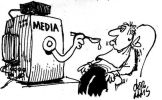 This article argues that you could probably get away with some nasty cartoons in a truly free press because such a press would freely report all sides to a dispute and not leave whole regions and classes of people with no expression in an international argument mediatized by the very same bunch of pillaging and plundering power elites, corporate and government, who profit from their silence. The article also wonders (but does not profess to know) whether the cold blooded assassinations at Charlie Hebdo were really an act of Islamic terrorism, or another false flag, on the principle of cui bono.
This article argues that you could probably get away with some nasty cartoons in a truly free press because such a press would freely report all sides to a dispute and not leave whole regions and classes of people with no expression in an international argument mediatized by the very same bunch of pillaging and plundering power elites, corporate and government, who profit from their silence. The article also wonders (but does not profess to know) whether the cold blooded assassinations at Charlie Hebdo were really an act of Islamic terrorism, or another false flag, on the principle of cui bono.
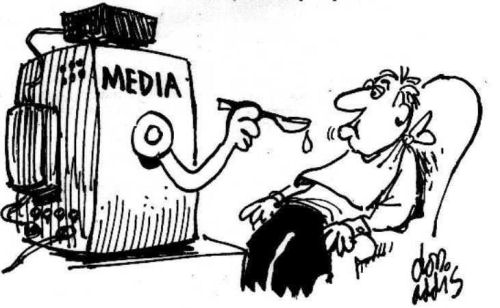 I remember thinking that Charlie Hebdo was overdoing rather unfunny cartoons to demonstrate defiance without seeming to give any thought to how wronged people in the Middle East have a right to feel, due to the effects of continuing colonialism – corporate and national – under the auspices of a US-led NATO. My observations in this 2012 article, “Anti-Islamic film - not so funny,” earned me capitalized insults as a leftist apologist for Islamic terrorism, anti-feminism and censorship. There was so much sound and fury in this correspondence that it left no room for any alternative explanation or dialogue. And that is the dynamic that false flags exploit.
I remember thinking that Charlie Hebdo was overdoing rather unfunny cartoons to demonstrate defiance without seeming to give any thought to how wronged people in the Middle East have a right to feel, due to the effects of continuing colonialism – corporate and national – under the auspices of a US-led NATO. My observations in this 2012 article, “Anti-Islamic film - not so funny,” earned me capitalized insults as a leftist apologist for Islamic terrorism, anti-feminism and censorship. There was so much sound and fury in this correspondence that it left no room for any alternative explanation or dialogue. And that is the dynamic that false flags exploit.
Western treatment of Middle East and Media support for this
It’s all very well to celebrate a free press, but, since when is the Western mainstream newsmedia actually independent and free? Not only is it heavily biased in its reporting on the Middle East – when so much is at stake – but their barracking for the destruction of US/NATO targets seems actually to incite hatred and thereby encourage some people to join jihads. Let me put it this way, the mainstream newsmedia has a way of presenting the powers it wants to split and topple in the Middle East (and the East) as if they were all variations on Vlad the Impaler, imbuing its reports with quivering outrage and bathos, so that it must seem to many that the only honorable thing to do is to go and fight with the ‘rebels’ whom the press and NATO champion. Hence, it appears, the influx of foreign ‘rebel’ fighters from Australia, France, Britain and elsewhere and the widespread ignorance of the other side.
Charlie Hebdo might have a reputation for being outspoken, but to me it seemed to toe the US/NATO establishment line on illegal wars in the Middle East. For instance it didn’t question virtually baseless Western allegations that Bashar al-Assad is a ‘brutal dictator’, but casually exploited the propaganda in a cartoon showing the Syrian president standing triumphantly in front of a mountain of human bones like a hunter. If Charlie’s objective was largely to lampoon religion of all kinds, then there was another reason not to lampoon Bashar al-Assad, who presides over the last secular Arab state. [1] In other words, modern Charlie Hebdo was not politically subtle, critical, inquiring or a champion of Truth. Perhaps if it had been, it could have built bridges.
It seems to me that if the mainstream news and traditional alternative media really reported fairly, both, all sides of what is happening in the Middle East, then maybe people would not get so bothered about cartoons. Also maybe the cartoons would be a bit funnier and more informed. If the mainstream newsmedia did not constantly support and whitewash the Western military financial and industrial machine, this kind of violent response from the Middle East would have far less support. If the mainstream Western media interviewed, not just ‘rebels’ but government and a wide variety of citizens in Saudi Arabia or in Syria, for instance, those countries would have real voices and we would have ears to hear them. If it had done so in Iraq and Libya those countries might today be intact.
At candobetter.net we have often carried copies of letters to our media, especially SBS and ABC, the Australian state television channels, asking them to report more accurately on Middle Eastern and Eastern affairs because of the danger to peace that reporting propaganda carries. See http://candobetter.net/taxonomy/term/5364 Only on one occasion have we recorded a retraction. See ABC Australia apologises for bias against Russia in reporting MH17 crash. However this was a private apology, not a public statement on television.
False flag?
I have so far written with the assumption that the Charlie Hebdo assassinations were not a false flag. Because false flags are the other side of the history of aggressive capitalist interference in the Middle East and other oil producing countries of the ‘undeveloped world’, and they are fundamental to the history of war. How else do you get peoples who hardly know each other to try to kill each other? You have to give them a reason that they believe is true.
A truly free Western newsmedia would make false flags a lot harder to fly, but today’s newsmedia actively conveys state propaganda designed to terrify the public into supporting wars and bad laws, whilst presenting it as news and entertainment.
False flags have also been used by the US as methods to goad other countries into supporting it. Europe is too close to comfort to the Middle East to be gung ho about starting wars there. Its support for the US in NATO recently has been bizarre. On one interpretation [3], it could be that, like Russia, it chooses to appease the United States, in the hope of preventing all-out war. The terrorist attacks could have been a warning to Hollande not to take an independent stand vis a vis Russia. Just five days ago he was upbeat about the sanctions being lifted if talks went well. How long is that going to last after this series of terrorist attacks?
One cannot help but ask, if this horrible Charlie Hebdo massacre was really an act of terrorism by Muslims, why would they attack cartoonists and lone journalists, instead of the big media owners and NATO policy-supporting politicians? After all, the US has had no qualms in planning and carrying out or supporting assassinations of leaders, such as of Fidel Castro, Sadadm Husein, Muammar Gaddaffi, and, still in the firing line: Bashar al-Assad. One might say it could be too hard for a bunch of poor Muslims to get to anyone rich and powerful, but poor Muslims are supposed to have flown planes into the World Trade Center and to have carried out numerous other sophisticated acts of terror. In the case of false flags though, the power elite is not going to target its own. That would better explain to me the targeting of politically lesser citizens.
I won’t go into the nuts and bolts of the reporting of the Charlie Hebdo massacre and its sequel, but some aspects immediately seem odd. One is the shooting of a policeman in the head without blood appearing, censored by France2 News because of its graphic nature – except that the real footage, whilst tragic, was strangely ungraphic. See http://www.conspiracyclub.co/2015/01/07/paris-fake-terrorism/. Then there was the identity card left in a vehicle by one of the terrorists, reminiscent of the passport found in the wreckage of the 9-11 towers. After that there was the police chase of two suspected terrorists which culminated in a shoot-out where the terrorists lost their lives, leaving no-one to tell their story. And then there was the second in command detective who shot himself at Lieges, the night of the Charlie Hebdo assassinations. http://www.lepopulaire.fr/limousin/actualite/2015/01/08/un-commissaire-de-police-de-limoges-se-suicide-dans-son-bureau_11283307.htmlHe was deeply involved in the investigation of the Charlie Hebdo cases of Muslim protest, which had been ongoing for years and was the second detective to apparently suicide in the same team in slightly over one year.
The mainstream Western press has a tendency to report the US-NATO view and which ever so-called revolutionary group they support. It does not canvas the opinions of people who do not identify with Western supported revolutionaries; it does not ask government opinion. If the press reporting on the Middle East, notably on Syria, Iran, Iraq and Libya (as well as Russia and Ukraine in Eastern Europe) actually got reports from many sides, then the people in those countries and those who identify with them would be less likely to see the Western Press as an enemy.
The West has been instrumental in bringing down leaders and governments and sowing chaos to an extent in the Middle East that most Western citizens have no inkling of because this chaotic war and looting machine called ‘capitalism and democracy’ is marketed by the Western Press as a positive force, whilst the people it is trampling are portrayed as irrational, bloodthirsty religious maniacs and international terrorists. The mainstream press generally does not make overt fun of Islam and Mohammed, but a wing of the press that identifies itself as revolutionary free press and critical of the status quo, does, purportedly to dramatise and ridicule Islam’s apparent contempt for free speech.
Charlie Hebdooriginally became a fatwa target in 2 November 2011when it published an edition on Islam, with a cover of a a cartoon Muslim saying, “100 lashes if you don’t die laughing!”. In 2012 it followed with a large number of insulting cartoons about Mohammed as a gesture of indignation against moves to censor media critical of Islam.
The context was a film called Innocence of Muslims which parts of which available on you-tube portrayed the founder of Islam in a very bad personal and political light and Muslims as aggressively anti-Christian. Publicity about this film was accompanied by widespread riots by Muslims against foreign embassies, particularly US embassies, including riots in Sydney on 15 September 2012, with police injured. At the same time warships from more than 25 countries, including the United States, Britain, France, Saudi Arabia and the UAE, were together launching a military exercise in the Straits of Hormuz, in response to threats to close it off. There was plenty of reason for Muslims to be angry with and frightened by the West apart from that film. Today the stakes are even higher and the misery of war-torn and subdivided Middle East is even greater than it was.
Maybe therefore Westerners should hold their own governments and media proprietors to greater account if we are to avoid World War Three.
Yes, we do need a really free press in the West. That is worth fighting for. Then maybe we can have cartoons and the truth in all its aspects, with a voice for everyone.
NOTES
[1]President Bashar al-Assad, although the butt of so much mediatized professionally politicized opprobrium, totally fails to bluster and threaten, but continues doggedly to present Syria’s case.
[2] International and human rights professor of law, Francis Boyle’s Destroying Libya and World Order: The Three-Decade US Campaign to Terminate the Qaddafi Revolution , (Kindle Locations 1787-1841), have suggested this view to me.
War and Economic Terrorism: Diverging Voices. David Cameron vs. Cristina Fernandez
5 Oct 2014, by Colin Todhunter. Republished from Global Research.
See also on Global Research: US Vice-President Joe Biden Blames Washington's Middle East Allies for Financing ISIS (5/10/14) by Patrick Hennigsen, Obama's Plan For a 'No-Fly Zone' Over Northeastern Syria – ISIS Was a Window-Dressing for the Real War Against the (3/10/14) by 21st Century Wire, The Islamic State Opens Its First Consulate in Turkey's Capital. Issuing Visas to Foreign Fighters (2/10/14) by PressTV, War on ISIS and Media Lies: The Comic Book Simplicity Of Propaganda (1/10/14) by Media Lens.
Cristina Fernandez de Kirchner's recent speech at the UN was a breath of fresh air. She spoke about economic terrorism and the reasons why some people turn to violence and told the audience how a bankrupt Argentina managed to turn away from hard-line economic neoliberal orthodoxy and stimulate growth. She also discussed the need for multilateral approaches to solving the world's problems as well as the need to regulate 'vulture funds' that cripple sovereign states' ability to function.
While the President of Argentina offered some alternatives to US unilateralism and institutionalised economic injustices, British PM David Cameron promoted the usual tired rhetoric. In an attempt to justify attacking Iraq and Syria, he spoke of the supposed virtues of Western-style freedom, democracy and economic neoliberalism, while denouncing the Islamic State (IS), extremism and terrorism.
Cameron also stated that anyone who questions the official stories concerning 9/11 in the US or 7/7 in Britain or who criticises British foreign policy is a 'non-violent extremist'. While pointing the finger at radical Muslims clerics and their followers, Cameron was regarded by many as sending out a warning to anyone, Muslim or otherwise, who questions such things or criticizes certain policies.
After all, who could possibly protest against illegally bombing or invading sovereign nation states to eradicate head-chopping extremists or tyrants or evil-doers that would otherwise attack Britain and carry out butchery and terror?
Defeating terrorism as cover for wars of imperialism
Such made-for-TV narratives are repeated time and again and are so effective because they are so simplistic. Create a threat, demonise it, invoke fear and get the population on board to deal with it militarily. Who could question 'honest Dave' with his 'we are all in this together' platitudes.
Prior to Cameron's speech, British Foreign Secretary Philip Hammond told the British press that IS militants are turning large swathes of Iraq and Syria into launch pads to stage terror attacks on Western nations. He said that with the "barbaric ideology" of the Sunni insurgents, "sooner or later they will seek to strike us on British soil."
Not long after, Home Secretary Theresa May announced she was preparing new laws to tackle Islamist militants at home and to stop them going abroad to fight. May said that that Britain faced a long struggle against a deadly extremist ideology that could take even decades.
To the uniformed, Cameron, Hammond and May's narratives can be very convincing – as convincing as Blair's lies were back in 2003 regarding those non-existent Iraqi weapons of mass destruction.
Leading politicians act as the PR arm of the military-financial industrial complex: the big oil companies, the Wall Street/City of London financial institutions, the weapons manufacturers and huge corporations. All of these own strategic sectors of the economy and determine the nature of politics via their think tanks, foundations, funding and wealth, high-level contacts, revolving doors into the high echelons of power and compliant politicians. From BAe, Lockheed Martin and Boeing to Barclays, Goldman Sachs, BP, Chevron and Occidental Petroleum, these and dozens of other similar entities constitute the backbone of what is a structurally overlapping Anglo-US led Western establishment. Like Tony Blair, Cameron's media-friendly bonhomie is slicker than the most experienced used car salesman and is key to selling the establishment's endless wars to the public.
Of course, you will never hear Cameron bring up the extremism of the Project for a New American Century or discuss the Wolfowitz doctrine, the neo-con blueprints for the West's ongoing wars of terror, destabilisations, covert operations, killings and torture that have nothing to do with humanitarianism or 'fighting evil' and everything to do with securing world domination, pipeline routes and resources, while denying the same to others. Such things are not to be discussed in public. Defeating terrorism serves as rhetorical cover for imperialist wars.
We must keep to the 'facts'; the facts as designated by Cameron and those who wish to bury the real facts. We must listen to rhetoric about the wonders of economic liberalism and a thriving democracy, while populations live under the yoke of banker-imposed austerity and mass state surveillance. We must stick to the story that the proper and effective way of preventing terror involves stopping the brain washing of young Muslims at home and that preventing terror abroad is all about rooting out extremists (in resource-rich or resource-transit countries).
Do not associate the 'Muslim problem' with wars of intervention and occupation and the machinations of Empire in Muslim countries. Out of sight, out of mind, thanks partly to the media, including the BBC – a taxpayer-funded 'public service' broadcaster whose selective reporting and willingness to tow the official line does anything but serve the public.
Economic terror of 'globalisation': democracy under threat
According to economics professor John Foster, the aggregate wealth of Britain's richest 1,000 people was in 2010 some 333 billion pounds. In 2010, Britain's aggregate national debt was half that amount. In 2009, at the height of the economic crisis, the top 1,000 increased their wealth by a third, meaning that the amount they actually increased their wealth by in just one year was half of the national debt. Yet public sector jobs are being slashed and the welfare state dismantled, while money is always readily available for the next war. Is this not extremism?
How easy it is to conveniently ignore state-corporate extremism under the guise of 'globalisation' across the world that has resulted in central states abdicating their responsibilities by submitting to the tenets of the Wall Street/City of London-backed pro-privatisation policies, free capital flows, commodity market rigging, debt speculation, massive profits and unaccountable cartels, which aim to maximise profit by beating down labour costs and grabbing resources. Is that not extremism?
While Cameron stood at the UN eulogising about neoliberalism and Western democracy, powerful financial institutions attempt to impoverish and destabilise states like Argentina and render the concepts of national sovereignty and democracy utterly meaningless. To rake in even further unimaginable profits, 'vulture funds' have no compulsion in wrecking the lives of millions of ordinary people by bankrupting national economies, seizing their assets and crippling sovereign states' ability to properly function by extorting money and chaining them to debt.
Argentina's President Cristina Fernandez de Kirchner said in her speech to the UN General Assembly:
"... terrorists are not only those who go planting bombs, there are economic terrorists who destabilise the economy of a country and produce poverty, hunger and misery from the sin of speculation. It is something we should say very clearly."
She also asked who gave the 'terrorists' in the Middle East their weapons in the first place, subtly pointing to the West's complicity in arming 'freedom fighters' who, according to how the geo-political game is going, are suddenly labelled 'terrorists' (and vice versa). From Kosovo to Syria and Libya, the US and its allies have excelled in this.
How easy it is for officials to bypass democratic processes, sideline the public and negotiate secretive 'free trade' deals on behalf of powerful private corporations. The Transatlantic Trade and Investment Partnership (and similar agreements around the world) could undo decades of hard work that resulted in laws protecting consumers, workers and their families and the environment. Regulations are to be dismantled, laws to be written, investors' rights to be prioritised and democratic processes disregarded for the benefit of wealthy private corporations under the pretence of 'free' trade. Is this type of bare-faced corporate plunder and duplicity not extremism? Is this the type of economic freedom Cameron means?
How easy it is to destroy any notion of freedom via the illegal mass surveillance of the state that pries into habits, beliefs, motivations, conversations, allegiances of every ordinary citizen. Is that not extremism?
As democracy is hollowed out and corrupt global cartels record massive profits and institute their plunder, all of this is portrayed by the mainstream media and political leaders as 'normality' as the way things are and have to be, based on the lie that 'there is no alternative'.
Does the type of democracy that Cameron has in mind involve record levels of inequalities, an unhindered revolving door between government and big business, food safety/regulation authorities being hijacked by corporate interests and police and intelligence agencies infiltrating, harassing or subverting legitimate groups?
From India to South America, the destruction of food sovereignty and traditional agriculture and indigenous people's being driven from their lands by big agritech concerns, resource extraction industries and land grabbing speculators is commonplace and facilitated by the process of 'globalisation'.
The current economic system facilitates plunder and is presided over by well-funded and influential foundations and powerful financial-corporate entities and their stooges in the IMF, World Bank and WTO.The result is the deception that imperialist wars are fought in the name of fighting terror, austerity is imposed in the name of prosperity and mass surveillance is carried out under the banner of protecting freedom.
In finishing, it should be acknowledged that there are extremist violent thugs who carry out barbarity under the banner of Islam and who should never be funded or armed in order to do the bidding of what Cristina Fernandez de Kirchner called the 'great powers' (or their allies) as has been the case. Sovereign states should receive genuine assistance to tackle such groups on their own soil.
Nevertheless, David Cameron, Theresa May and Philip Hammond would do well to ponder on Cristina de Kirchner's speech and just where the heart of extremism really lies in today's world.
The Internet targeted by Australia's proposed new 'anti-terror' laws
 Australia does totalitarianism poorly. The PATRIOT act at least appeared to have some limitations. These proposed new laws [1] don't encroach on privacy, they completely obliterate it. The Liberals are doing what the Nazi's did, minus the economic improvements, conservation and infrastructure (there's something to think about!).
Australia does totalitarianism poorly. The PATRIOT act at least appeared to have some limitations. These proposed new laws [1] don't encroach on privacy, they completely obliterate it. The Liberals are doing what the Nazi's did, minus the economic improvements, conservation and infrastructure (there's something to think about!).
It essentially implements the Internet monitoring that we were worried about years ago. There is little reason to doubt that Australian spies won't have a warrant to monitor one computer or device on the internet as soon as they can (I strongly suspect these laws legitimise what has been long standing practice and that such monitoring has been in place). We can consider the internet monitored, as these laws define no boundaries. This is no different to if the government had said "we will monitor the internet however we like".
I ask which "terrorist" organisation has the capability to threaten our liberties and rights to this extent? And all this from what? The media lying to the population by stating there was a beheading planned!See also international alert regarding Australia's draconian laws: "Australia on the Verge of Permitting Alarmingly Broad Internet Surveillance " by Emily Tankin.
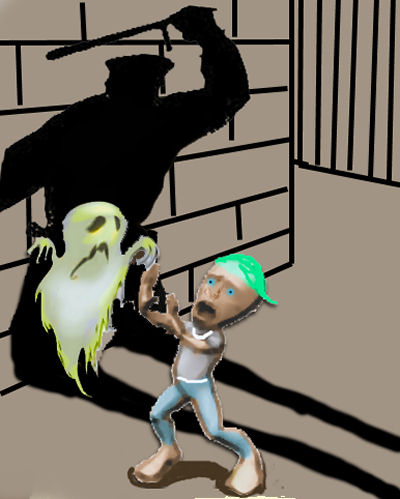 [Article adapted from from this comment of 27 September 2014.]
[Article adapted from from this comment of 27 September 2014.]
"Remember, when the power structure sees a meme is working they double and triple down on it. With the beheading videos effectively pushing the American public back into a post-9/11 fetal position, it became clear that the fear of “beheadings” is enough to send the Western public into a total panic state. Then, suddenly a plot emerges that ISIS related terrorists were planning to publicly behead an Australian citizen in the middle of Sydney. As usual, mainstream media rushed to scare the shit out of everyone." [Source: "Australia Unleashes Draconian New Anti-Terror Law In Orwellian Orgy Of Baseless Fear-Mongering"]
Note that the police only confirmed 'violence', NOT beheadings being planned (or merely discussed or mentioned).[2] Colour me cynical, but this is a blatant attempt to jerk Australia back under the boot of authoritarian conservatism and give licence for military action against Syria, oops, sorry, ISIS... All the government agencies have to do, is follow anyone they want to make a target, and it is inevitable you can find something to blow up. The ISIS angle works doubly well, because objecting to the coming conflict paints one as someone against a humanitarian mission.
Consider the following, if one wanted to ban the Macrame and Crochet society, or ban knitting needles.
1) You begin surveillance of members of the Macrame and Crochet society, infiltrate meetings, etc.
2) Wait. Record everything.
3) Have a record of a phone call of Mavis telling Ethel "That Tony, I tell ya, he needs a good kick in the bum". Every Australian at some point or another says something along these lines about some politician. Chaff bag anyone?
4) Say that members of the organisation have been "planning violence" against Australians (true in a very strict sense), then LATER, mention its a politician.
5) Have the media use phrases like "The Macrame and Crochet society has been under surveillance...." . It is technically true and people will assume they must have done something wrong to be under surveillance. "Known to the police", "Was under surveillance" are scary sounding phrases which imply guilt and danger, but could actually be completely meaningless.
6) Organise 800 riot goons to arrest Mavis, complete with media presence (how do they know?). Call it the biggest anti-terror operation in history (again, technically true, because you've made it true).
7) Don't make effort to correct the media if they talk of 'stabbing people with knitting needles'. The media are allowed to get things wrong. Journalists don't get fired for mistakes. You can talk of remaining calm, but neglect to mention the media whipping things up, and do nothing at all to calm people.
And there you have it, you can have the population in hysteria, thinking that old grannies are going to gouge eyes out with knitting needles. The beauty of this scam is you don't have to lie! Hand on your heart, its all true!
The scariest thing was, as I was writing this, I had in the back of my mind that this could be a risk. That this would be monitored, put against my name. I would have never thought 20 years ago that in Australia it would be like this, but here we are... I remember as a child my grandmother telling me stories of how everyone was monitored in Nazi Germany, that people would dob on each other (often just out of spite) and that things you said could be used against you later. From what I've heard of people who lived in Communist countries, it wasn't too different there. These regimes did NOT have armed guards at every corner, STOPPING you from speaking. No, you were free to speak in Communist Russia, or Nazi Germany, but you never knew what was recorded, and you would find, sometime in the future, after exercising your 'freedom', you're in trouble.
NOTES
[1] Australia Unleashes Draconian New Anti-Terror Law In Orwellian Orgy Of Baseless Fear-Mongering (25/9/14)
Australian spies will soon have the power to monitor the entire Australian internet with just one warrant, and journalists and whistleblowers will face up to 10 years’ jail for disclosing classified information.
The government’s first tranche of tougher anti-terrorism laws, which beef up the domestic spy agency ASIO’s powers, passed the Senate 44 votes for and 12 against on Thursday night with bipartisan support from Labor.
The bill, the National Security Legislation Amendment Bill (No. 1) 2014, will now be sent to the House of Representatives, where passage is all but guaranteed on Tuesday at the earliest.
Anyone — including journalists, whistleblowers and bloggers — who “recklessly” discloses “information … [that] relates to a special intelligence operation” faces up to 10 years’ jail.
Any operation can be declared “special” and doing so gives ASIO criminal and civil immunity. Many, including lawyers and academics, have said they fear the agency will abuse this power.
Those who identify ASIO agents could also face a decade in prison under the new laws, a tenfold increase in the existing maximum penalty.
These changes have opposition support and would make it a criminal office to travel to a terrorist hot-spot without a reasonable excuse.
Iran stands up to United States' bullying of Syria
The article below has been adapted from the PressTV article US to regret military action in Syria: IRGC chief (16/9/14). The Appendix, also from PressTV, is Obama threatens to oust Assad if US planes downed in Syrian airspace (16/9/14). To view the embedded videos, please visit those pages.
US to regret military action in Syria: IRGC chief
Tue Sep 16, 2014 10:7AM GMT
|
The chief of Iran's Islamic Revolution Guards Corps (IRGC) says the US and its allies will regret any military operation in Syria. 'The Islamic Republic of Iran's policy is to support Syria and this US action is from a bullying position and is condemned and if it does so it will regret it," Major General Mohammad Ali Jafari said on Tuesday. The general was reacting to the US government's (claimed)1 decision to form an international coalition to fight the Takfiri ISIL terrorists fighting in Syria and Iraq. |
'The US is disappointed with any influential role to be played by the ISIL and similar groups and it is calling for this so-called coalition. We doubt if their serious objective is to annihilate the ISIL," Jafari said.
He noted that the US is declaring war on the ISIL while it continues to support other militant groups fighting the government of Syrian President Bashar al-Assad.
Jafari said the enemies are determined to topple the 'current ruling government in Syria."
The general said the US and the Israeli regime created this group in order to trigger war among Muslims in the Middle East regime and serve as an obstacle to resistance against the Zionist regime.
On Monday, France hosted a conference, dubbed the International Conference on Peace and Security in Iraq, to discuss ways of tackling the ISIL terrorists in Iraq and Syria amid US efforts to form a so-called international coalition to battle the Takfiri group.
Despite the international community's emphasis on the importance of Iran's role in the regional developments, Tehran was not invited to the meeting in Paris mainly due to the US opposition.
The US has also announced that Iran will not be a part of its so-called coalition against the ISIL.
Iran has cast doubt over the sincerity of the coalition and reiterated that it had no interest in attending the Paris meeting.
Tehran has on several occasions voiced support for the Iraqi government since it began fighting against the ISIL in June. The ISIL terrorists are in control of some areas in Syria and have captured large swathes of land in neighboring Iraq.
The Takfiri terrorist groups have committed heinous crimes and threatened all communities, including Shias, Sunnis, Kurds, Christians and Izadi Kurds, during their advances.
Obama threatens to oust Assad if US planes downed in Syrian airspace
Mon Sep 15, 2014 6:53AM GMT
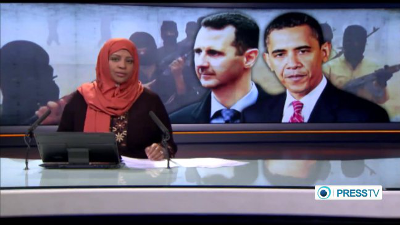 |
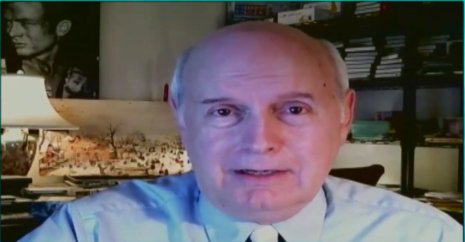 |
|
PressTV interviewer and Jim W. Dean of Veterens Today
|
|
US President Barack Obama has threatened to wipe out Syria's air defense system and topple the Syrian government if President Bashar al-Assad ordered his forces to shoot American planes entering Syrian airspace.
He made the remarks during a meeting in the White House before his speech about Washington's strategy about the ISIL terrorist group, The New York Times reported on Sunday.
Obama ordered the US military on Wednesday to expand its bombing campaign against ISIL terrorists and launch airstrikes in Syria.
'If he [Assad] dared to do that, Mr. Obama said he would order American forces to wipe out Syria's air defense system, which he noted would be easier than striking ISIS (or ISIL) because its locations are better known," the newspaper said.
'He went on to say that such an action by Mr. Assad would lead to his overthrow, according to one account," the Times said.
The US president also noted that ISIL made a major strategic error by killing American journalists James Foley and Steven Sotloff 'because the anger it generated resulted in the American public's quickly backing military action."
During his televised speech on Wednesday, Obama said, "I will not hesitate to take action against ISIL in Syria, as well as Iraq."
"America will lead a broad coalition to roll back this terrorist threat," he said.
The Pentagon announced that the United States already has conducted more than 150 airstrikes against ISIL targets in Iraq.
Meanwhile, Syrian Foreign Minister Walid al-Moallem has warned the US and its allies against attacking ISIL targets on Syrian soil.
"Syria is ready to cooperate and coordinate with regional and international efforts to combat terror in accordance with UN resolutions and respect of Syrian sovereignty," he said in Damascus last month.
"Everyone is welcome, including Britain and the United States, to take action against ISIS and Nusra with a prior full coordination with the Syrian government," Moallem added.
On Sunday, US Secretary of State John Kerry said Washington will not coordinate its airstrikes on ISIL terrorists inside Syria.
'We're not going to coordinate it with Syria... It's not a cooperative effort. We are going to do what they haven't done, what they had plenty of opportunity to do, which is to take on ISIL and to degrade it and eliminate as a threat," Kerry said.
AGB/AGB
Footnote[s]
1. ↑ The parenthesised "(claimed)" was added. A shortcoming with some PressTV articles, or with their English translations, is that where a claim, that conforms to the Western imperialist narrative of a conflict has been repeated often enough by the msm, it is often reported by PressTV as fact, even where credible dissident journalists have challenged that claim. An example is the claim that the United States and its allies are waging war in Iraq and threatening to do so in Syria to destroy ISIS. See Washington Menaces America with its ISIS Creation (11/9/14) by Tony Cartalucci and ISIL operating with help of foreign military power (17/9/14) by Gordon Duff, senior editor of Veterans Today.
A Strange Confluence: Australian 'war on terror' and Australian jihadists
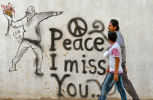 Highlighting the hypocrisy and double standards of Australia's official 'commitment' to the 'war on terror' in Afghanistan, and the celebration of the 'heroic sacrifices' made there by Australian soldiers on Remembrance day, was the appearance in our media of a video clip from Syria the following day.
Highlighting the hypocrisy and double standards of Australia's official 'commitment' to the 'war on terror' in Afghanistan, and the celebration of the 'heroic sacrifices' made there by Australian soldiers on Remembrance day, was the appearance in our media of a video clip from Syria the following day.
This video, from the studios of the 'Al Qaeda linked group' Jabhat al Nusra, showed the last minutes before the martyrdom of 'Abu Asma al Australi', as he drove an explosives packed truck towards a military checkpoint at an airport in Deir al Zour, in Syria's north-east. In the video 'Abu Asma's' face was fuzzed out, though we could see a bushy beard and a stocky physique. He delivered a propaganda message of encouragement to Muslims everywhere to take up the Jihad in Syria, and make the ultimate sacrifice.
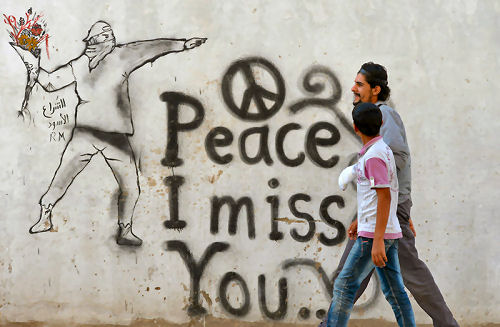 While this man was known to Australian authorities, - allegedly 'Ahmad' from Logan near Brisbane - and belonged to a community there which supports 'the jihad' against the Assad government, his family claims he never went to Syria to fight, and is alive and well and living in Turkey. They also claim that he didn't speak Arabic like the man shown in the video ....
While this man was known to Australian authorities, - allegedly 'Ahmad' from Logan near Brisbane - and belonged to a community there which supports 'the jihad' against the Assad government, his family claims he never went to Syria to fight, and is alive and well and living in Turkey. They also claim that he didn't speak Arabic like the man shown in the video ....
But these are details; the intent was there, and the 'operation' supported by Australian supporters of the insurgency or jihad if you prefer. Our concern should be whether this support extends beyond Ahmad's community, and whether allowance is being made for Australia's first suicide bomber because he was striking an 'approved target'?
Although our media may not be strictly government operated, the man who pays the piper calls the tune; the language used to describe this terrorist atrocity tells us the story. Nowhere is there mention in the ABC report on this video of 'terrorist' or 'war crime' - we have only 'jihadist', and 'hard-line group'. But worse by far than this, we are never told about 'the target' of 'the operation'. A TV reporter referred to 'people' killed, but honourably corrected himself with 'government soldiers', but failed to say how many.
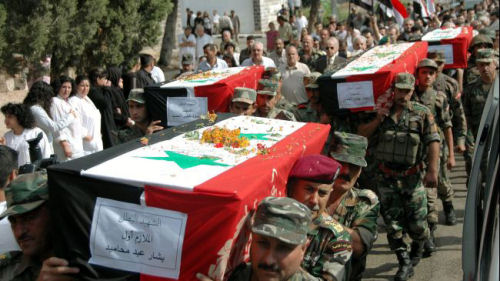
The truth is shocking.
This one Australian 'hero' ( as he is regarded now as a martyr) on one day killed as many Syrian soldiers as those of our Australian 'heroes' who have been killed in Afghanistan in a decade. Thirty five Syrian soldiers were obliterated by 'Abu Asma al Australi's' truck bomb; ordinary men with families, mothers, wives, sons, fathers. Men fighting to save their nation from a foreign invasion of barbarians and fundamentalist psychopaths; fighting to protect their neighbours and communities from random acts of violence, and save their country from the malign foreign powers who slash and burn what they have failed to seduce.
An estimated 27,000 Syrian soldiers have now died protecting their country, many as a result of similar bombings; along with a further 15,000 militia members fighting on the government side, they constitute the largest group of casualties in the total death toll of around 115,000.
ABC report from M/E correspondent Matt Brown with video link:
http://www.abc.net.au/am/content/2013/s3888818.htm
Turkish protesters hold Erdogan to blame for Reyhanli terrorist outrage
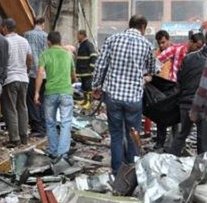
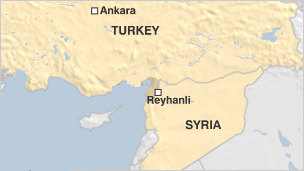
First published on PressTV, 12 May 2013 as Protesters tell Erdogan to resign. Other reporting (and misreporting) of Reyhanli terrorist bombing, and issues arising, includes: Information Minister: Turkey Bombings Terrorist Act Condemned by All Standards - SANA, Turkey blames Syria over Reyhanli bombings - Guardian, Turkey says Syrian forces behind border town bombings - Reuters, Dozens dead in Turkey car bombings - Brisbane Times, Turkey claims Assad loyalists bombed Reyhanli - , Blasts kill dozens in Turkish town Reyhanli on Syria border - BBC, Iran slams explosions in Turkish city of Reyhanli - PressTV.
Turkish protesters have called for Prime Minister Recep Tayyip Erdogan to step down following two car bombings in a town near the Syrian border.
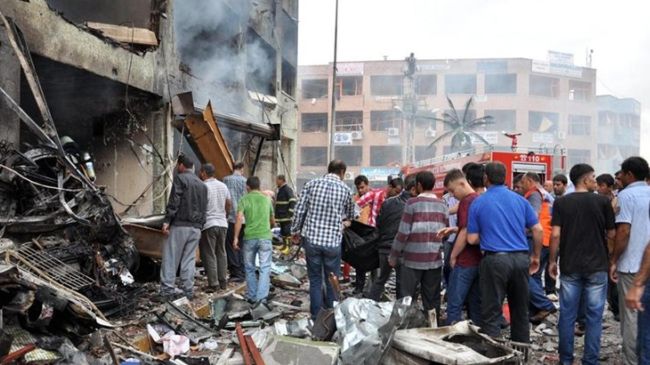
Scores of people took to the streets of the town of Reyhanli in Hatay province on Saturday after more than 40 people were killed in two car bombings that jolted the town earlier in the day.
The angry demonstrators said the outbreak of violence was due to the Erdogan administration’s anti-Syria policy.
Security was tight in the center of Reyhanli, near the scene of the blasts, with the security forces setting up checkpoints to control entry into and exit from the town, witnesses said.
A similar demonstration was briefly held in Ankara, in which dozens of people marched in the street and chanted slogans criticizing Erdogan and Foreign Minister Ahmet Davutoglu.
Turkey has been one of Syrian President Bashar al-Assad's harshest critics and has supported the foreign-backed militants fighting to topple his government.
Turkish opposition parties have censured the Turkish government for its intervention in Syria’s internal affairs.
Last July, the leader of the Republican People’s Party warned the government against dragging the country into the “Middle Eastern quagmire” with its aggressive anti-Syria stance.
The Syria crisis began in March 2011, and many people, including large numbers of soldiers and security personnel, have been killed in the violence.
The Syrian government says that the chaos is being orchestrated from outside the country, and there are reports that a very large number of the militants are foreign nationals.
Editor's comment:
As has been explained on Twitter, "The province which was attacked supports the Syrian government." This is why that town was targeted by terrorists. The Turkish government and the mainstream media have not reported that protests against the Turkish Government have been held in the Turkish town of Reyhanli in which 46 were killed in the terrorist outrage of 11 May. Instead, unfounded claims, originating from the Turkish and U.S. governments, which try to attribute blame to the Syrian Government, have been reported. An example is the report Turkey blames Syria over Reyhanli bombings of 13 may in the Guardian The Syrian Government has condemned the outrage and comprehensively refuted any suggestion that it could have been behind the outrage.
Postscript: More Turkish protests against Erdogan over Reyhanli bombings
Adapted from Turkish protesters blame government for blasts from PressTV of 16 May 2013.
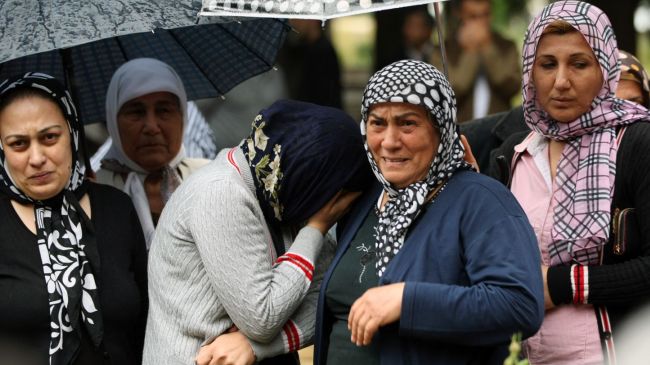
Relatives cry as pallbearers carry the coffin of Fehmi Karaca, 69, a shop owner killed in Saturday’s bombings, for burial in Reyhanli, Turkey, Sunday, May 12, 2013.
Hundreds of Turkish citizens have held demonstrations in the southern Turkish province Hatay and in the country’s largest city Istanbul to protest against Saturday’s twin car bombings, which killed 46 people and injured over a hundred others in the town of Reyhanli.
On Thursday, the protesters condemned the violence, noting that the outbreak of bloodshed was due to the Prime Minister Recep Tayyip Erdogan’s support for armed militants in Syria.
In Istanbul, the police used tear gas and water cannons to disperse the demonstrators who were marching towards the office of Erdogan.
A similar demonstration was held in Ankara on Saturday, in which dozens of people marched in the street and chanted slogans criticizing Erdogan and Foreign Minister Ahmet Davutoglu.
Turkey has accused Damascus of being behind the attack but Syria has dismissed the claim.
Syria Information Minister Omran al-Zohbi told a news conference on Sunday that his country "did not commit and would never commit such an act because our values would not allow that."
He blamed Ankara for the Saturday bombings in Reyhanli as well as the ongoing unrest in Syria by facilitating the flow of arms, explosives, vehicles, militants and money across the border into the Arab country.
"It is Erdogan who should be asked about this act... He and his party bear direct responsibility," Zohbi said.
The Syrian minister also stated that Turkey has planned the attacks to use them as a pretext to justify foreign intervention in Syria.
"Why this timing? Why these attack, just days before the meeting between Erdogan and (US President Barack) Obama? Does he (Erdogan), whose country is a NATO member, want to incite the United States (into intervening in Syria) by telling him his country has been attacked?" Zohbi said.
He added that the Turkish government has turned its border areas with Syria into centers for international terrorism.
World must unite to help Syria avoid Iraq's fate
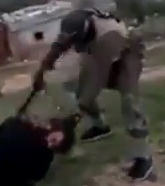
Syrian rebel fights
Assad 'tyranny' by
cutting off prisoner's
head with a knife.
See embedded video
- NOT suitable for
viewing by children.
In recent days, world public opinion and the global balance of power has shifted markedly in favour of the embattled nation of Syria and its allies. Nevertheless, it is imperative for every person opposed to mass murder to give whatever support they are able to the courageous Syrian people in their fight against the terrorist 'Free' 'Syrian' Army (FSA) proxies of the US and its allies.
The included article by Tony Cartalucci was originally published as World Must Unite Against US-Saudi-Israeli Proxy War in Syria on the Land Destroyer Report on 31 March. See also: Al-Jazeera anti-Syria propagandists expelled by Palestinians. Ex-CNN Reporter: I Received Orders to Manipulate News to Demonize Syria and Iran, BRICS Challenges Unipolar World and US Dollar Hegemony, Pan-Arab Popular Forum for Supporting Syria's Steadfastness Concludes Activities- SANA, Al-Jaafari..Arms' Treaty Draft Resolution didn't Include Ban on Supplying Weapons to Terrorist Groups - SANA, PA Speaker Calls on World Parliaments to Exert Pressure on Terror-Supporting Governments - SANA, Algerian Foreign Minister: Giving a Country's Seat to Non-State Entity Against AL Convention- SANA, Syria, Churkin: Russia Will Firmly Prevent Attempts to Grant Syria's UN Seat to Opposition- SANA.
Since early 2011, following the start of NATO's bloody war against Libya, the Syrian Government of President Bashar al-Assad has faced the start of a similar attempt at 'regime change' by terrorist 'Free' 'Syrian' Army (FSA) proxies of the United States and its allies. Unlike the tragic course of events which unfolded in Libya, the Syrian Arab Army (hereafter referred to as simply the "Syrian Army") has withstood the terrorists, contrary to repeated pronouncements by the lying mainstream media that Assad's downfall was imminent, although as many as 70,0001 Syrians may have already perished.
Since Tony Cartalucci wrote this article, world public opinion and the international balance of power has shifted markedly in Syria's favour. As an example the Summit of the BRICS coalition of Brazil, Russia, India, China and South Africa, which concluded on 27 March, opposed moves to escalate the war against Syria and threats to invade Iran. Russia has given a firm show of support for its Syrian ally by conducting large naval exercised off the Black Sea coast of NATO member Turkey, which has been supplying FSA terrorists and giving them sanctuary.
In spite of these developments, the survival of the Syrian nation, which traces its roots back to before the beginning of the Christian era, is not yet assured.
World Must Unite Against US-Saudi-Israeli Proxy War in Syria
By Tony Cartalucci, 31 March 2001
- US, Saudi Arabia, and Israel have conspired to destroy Syria by way of arming sectarian extremists since 2007.
- The West now admits it, along with Saudi Arabia and Qatar, have
provided thousands of tons of weapons to militants in Syria - while also
conceding that Al Qaeda's Syrian franchise, Jabhat al-Nusra is the best armed, most well equipped militant front in the conflict. - US, Saudi, Israeli-backed terrorists are now committing a myriad of
horrific atrocities against all of Syria's population, including Sunni
Muslims - meaning neither "democracy" nor even "sectarianism" drives the
conflict, but rather the destruction of Syria in its entirety. - US State Department acknowledges Syria faces threat from Al Qaeda,
demands blockade of arms/aid from reaching government to fight
terrorists the US State Department admits are present in every major
Syrian city.
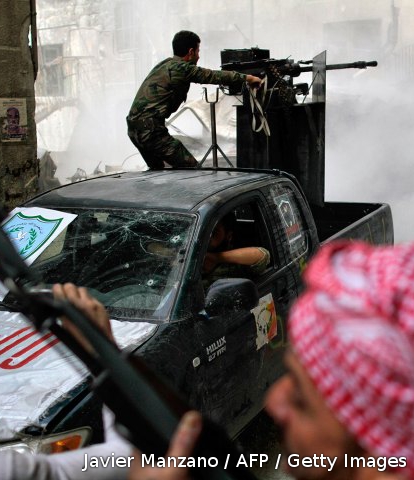
March 30, 2013 (LD) - Since 2007, the US, Saudi Arabia, and Israel documented as conspiring to overthrow the Syrian government by way of
sectarian extremists, including groups "sympathetic to Al Qaeda," and in
particular, the militant, sectarian Muslim Brotherhood. While the West
has attempted to portray the full-scale conflict beginning in Syria in
2011 as first, a "pro-democracy uprising," to now a "sectarian
conflict," recent atrocities carried out by US-Saudi-Israeli proxies
have shifted the assault to include Sunni Muslims unable or unwilling to
participate in the destruction of the Syrian state.
Such attacks included a mortar bombardment of Damascus University, killing 15 and injuring dozens more, as well as the brutal slaying of two prominent Sunni Muslim clerics - the latest of which was beheaded,
his body paraded through the streets of Aleppo, and his head hung from
the mosque he preached in. While the West attempts to mitigate these
events by labeling the victims as "pro-government," the reality is that
the forces fighting inside Syria are funded, armed, directed, and
politically supported from abroad - and therefore do not represent any
of the Syrian people's interests, including those Syrians who do not
support the government.
It is abundantly clear that the West's goal is neither to institute
"democracy," nor even take sides in a "sectarian conflict," but rather
carry out the complete and permanent destruction of Syria as a
nation-state, sparing no one, not even Sunnis.
Such a proxy war exists contra to any conceivable interpretation of
"international law." The world is left with a moral imperative to not
only denounce this insidious conflict brought upon the Syrian people,
compounded and perpetuated entirely by external interests, but demands
that concrete action is taken to ensure that this act of aggression is
brought to an end.
The US, UK, Saudi Arabia and Qatar have admitted to colluding together,
flooding Syria with thousands of tons of weapons via Jordan to Syria's
south, and NATO-member Turkey to Syria's north. And in an otherwise
inexplicable conundrum, while the likes of US Secretary of State John
Kerry insist this torrent of weapons is being directed to "moderates,"
neither the US nor its allies are able to explain why Al Qaeda terror
front Jabhat al-Nusra has emerged as the most heavily armed, best equipped militant organization in the conflict.
AP reported specifically in their article, "Officials: Arms shipments rise to Syrian rebels," that:
US Secretary of
State John Kerry said on the sidelines of a Syrian opposition meeting in Italy last month that the weapons are ending up in the hands of secular groups. "I will tell you this: There is a very clear ability now in the Syrian opposition to make certain that what goes to the moderate, legitimate opposition is in fact getting to them, and the indication is
that they are increasing their pressure as a result of that," he said,
without elaborating.
But even AP admits that
Syrian opposition
activists estimate there are 15-20 different brigades fighting in and
around Damascus now, each with up to 150 fighters. Many of them have
Islamic tendencies and bear black-and-white Islamic flags or
al-Qaeda-style flags on their Facebook pages. There is also a presence
of Jabhat al-Nusra, one of the strongest Islamic terrorist groups
fighting alongside the rebels.
The US State Department's own statement regarding the designation of al-Nusra as a listed Al Qaeda terror organization states:
Since November 2011, al-Nusrah Front has claimed nearly 600 attacks --
ranging from more than 40 suicide attacks to small arms and improvised
explosive device operations -- in major city centers including Damascus,
Aleppo, Hamah, Dara, Homs, Idlib, and Dayr al-Zawr.
According to the US State Department, al-Nusra is carrying out hundreds
of attacks with a wide array of weaponry, across the entire nation of
Syria, indicating a massive front and implying an equally massive
network of logistical support, including foreign sponsorship. What's
more, is that the US State Department acknowledges al-Nusra's presence
even in cities close to Syria's borders where the CIA is admittedly
overseeing the distribution of weapons and cash. The New York Times, in
their June 2012 article, "C.I.A. Said to Aid in Steering Arms to Syrian Opposition," reported that:
A small number of C.I.A. officers are operating secretly in southern
Turkey, helping allies decide which Syrian opposition fighters across
the border will receive arms to fight the Syrian government, according
to American officials and Arab intelligence officers.
And in New York Times' more recent March 2013 article, "Arms Airlift to Syria Rebels Expands, With Aid From C.I.A.," it is admitted that weapons are being funneled into Syria across both its borders with Turkey and Jordan:
With help from the C.I.A., Arab governments and Turkey have sharply
increased their military aid to Syria's opposition fighters in recent
months, expanding a secret airlift of arms and equipment for the
uprising against President Bashar al-Assad, according to air traffic
data, interviews with officials in several countries and the accounts of
rebel commanders.
The article would also state:
Although rebel commanders and the data indicate that Qatar and Saudi
Arabia had been shipping military materials via Turkey to the opposition
since early and late 2012, respectively, a major hurdle was removed
late last fall after the Turkish government agreed to allow the pace of
air shipments to accelerate, officials said.Simultaneously, arms and equipment were being purchased by Saudi Arabia in Croatia
and flown to Jordan on Jordanian cargo planes for rebels working in
southern Syria and for retransfer to Turkey for rebels groups operating
from there, several officials said.
The US State Department acknowledges that the well armed, prominent
terror front al-Nusra is operating in the very areas the CIA is feeding
weapons and cash into.
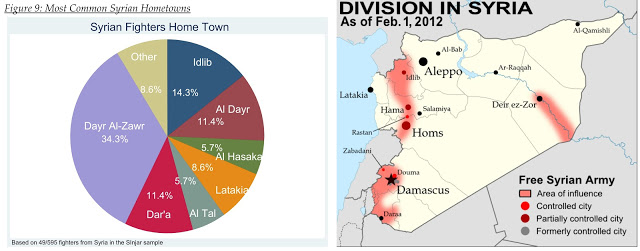
Image: (Above) West Point's Combating Terrorism Center's 2007 report,Al-Qa'ida's Foreign Fighters in Iraq"
indicated which areas in Syria Al Qaeda fighters filtering into
Iraq came from. The overwhelming majority of them came from Dayr Al-Zawr
in Syria's southeast, Idlib in the north near the Turkish-Syrian
border, and Dar'a in the south near the Jordanian-Syrian border. (Right)
A map indicating the epicenters of violence in Syria indicate that the
exact same hotbeds for Al Qaeda in 2007, now serve as the epicenters of
so-called "pro-democracy fighters" and also happen to be areas the US
CIA is admittedly distributing weapons and other aid in.
Such a reality directly
contradicts the US State Department's official position, and no
explanation is given as to how "moderates" can be provided with such
extensive support, and still be eclipsed militarily and logistically by
terror-front al-Nusra. That is, unless of course, the US, British,
Saudi, and Qatari weapons aren't simply just handing the weapons
directly to terrorists, precisely as planned as early as 2007.
The Destruction of Syria Began in 2007, Not 2011
While the West has attempted to reclaim Syria as part of its sphere of
influence for decades, concrete plans for the latest proxy war were laid
at least as early as 2007. It was admitted in 2007 that the US, Saudi
Arabia, and Israel conspired together to fund, arm, and direct sectarian
extremists including militants "sympathetic" to Al Qaeda, particularly
the Muslim Brotherhood, against the governments of Iran and Syria. In
Pulitzer Prize-winning journalist Seymour Hersh's 2007 New Yorker
article, "The Redirection: Is the Administration's new policy benefiting our enemies in the war on terrorism?" the conspiracy was described as follows:
To undermine Iran, which is predominantly Shiite, the Bush
Administration has decided, in effect, to reconfigure its priorities in
the Middle East. In Lebanon, the Administration has co-operated with
Saudi Arabia's government, which is Sunni, in clandestine operations
that are intended to weaken Hezbollah, the Shiite organization that is
backed by Iran. The U.S. has also taken part in clandestine operations
aimed at Iran and its ally Syria. A by-product of these activities has
been the bolstering of Sunni extremist groups that espouse a militant
vision of Islam and are hostile to America and sympathetic to Al Qaeda.
Hersh also cited US, Saudi, and Lebanese officials who indicated that,
"in the past year, the Saudis, the Israelis, and the Bush Administration have developed a series of informal understandings about their new
strategic direction," and that, "the Saudi government, with Washingtons
approval, would provide funds
and logistical aid to weaken the government of President Bashir Assad,
of Syria. The report would also state:
Some of the core tactics of the redirection are not public, however. The
clandestine operations have been kept secret, in some cases, by leaving
the execution or the funding to the Saudis, or by finding other ways to
work around the normal congressional appropriations process, current
and former officials close to the Administration said.
Mention of the Muslim Brotherhood already receiving aid even in 2007 was also made:
The Syrian Muslim Brotherhood, a branch of a radical Sunni movement
founded in Egypt in 1928, engaged in more than a decade of violent
opposition to the regime of Hafez Assad, Bashir's father. In 1982, the
Brotherhood took control of the city of Hama; Assad bombarded the city
for a week, killing between six thousand and twenty thousand people.
Membership in the Brotherhood is punishable by death in Syria. The
Brotherhood is also an avowed enemy of the U.S. and of Israel.
Nevertheless, Jumblatt said, "We told Cheney that the basic link between
Iran and Lebanon is Syria--and to weaken Iran you need to open the door
to effective Syrian opposition."There is evidence that the Administration's redirection strategy has
already benefitted the Brotherhood. The Syrian National Salvation Front
is a coalition of opposition groups whose principal members are a
faction led by Abdul Halim Khaddam, a former Syrian Vice-President who
defected in 2005, and the Brotherhood. A former high-ranking C.I.A.
officer told me, "The Americans have provided both political and
financial support. The Saudis are taking the lead with financial
support, but there is American involvement."He said that Khaddam, who
now lives in Paris, was getting money from Saudi Arabia, with the
knowledge of the White House. (In 2005, a delegation of the Front's
members met with officials from the National Security Council, according
to press reports.) A former White House official told me that the
Saudis had provided members of the Front with travel documents.
The Wall Street Journal in 2007 would also implicate the Muslim
Brotherhood and more specifically, the so-called "National Salvation
Front," in its article, "To Check Syria, U.S. Explores Bond With Muslim Brothers."
It is clear that the US, Saudi Arabia, and Israel planned to use
sectarian extremists against the nation of Syria starting at least as
early as 2007, and it is clear that now these sectarian extremists are
carrying out the destruction of Syria with a massive torrent of weapons
and cash provided by the US and its regional allies, just as was
described by Hersh's report.
A Moral Imperative to Save Syria
Syria is under attack by an insidious, premeditated foreign assault,
intentionally using terrorist proxies in direct and complete violation
of any conceivable interpretation of both national and international
law. The world has a moral imperative to support the Syrian people and
their government as they fight this assault - both politically and
logistically. While US Secretary John Kerry is unable to account for how
his nation's support for moderates has left Al Qaeda's al-Nusra front
the premier militant faction in Syria, he has demanded that Iraq help
stem the flow of alleged aid Iran is providing the Syrian government as
it fights these terrorists.
Does US Secretary of State John Kerry deny that Syria is fighting a
significant (and continuously growing) Al Qaeda presence within their
borders, which according to the US State Department's own statement, is
operating in every major city in the country? What conceivable
explanation or excuse could be made to justify the blockading of aid
sent to Syria to fight Al Qaeda terrorists? In fact, why isn't the US
aiding the Syrian government itself in its fight against Al Qaeda - a
terrorist organization the US has used as an excuse to wage unending
global war since 2001 when Al Qaeda allegedly killed some 3,000 American
civilians?
Does Secretary Kerry believe that further arming "moderates" is a
legitimate strategy to counter Al Qaeda's growing presence in Syria when
these "moderates" openly defend Al Qaeda's al-Nusra? The US' own
hand-picked "Syrian opposition leader," Mouaz al Khatib, demanded
the US reconsider its designation of al Nusra as a terrorist
organization. Retuers reported in their article, "Syrian opposition urges U.S. review of al-Nusra blacklisting," that:
The leader of
Syria's opposition coalition urged the United States on Wednesday to
review its decision to designate the militant Islamist Jabhat al-Nusra
as a terrorist group, saying religion was a legitimate motive for Syrian
rebels."The decision to consider a
party that is fighting the regime as a terrorist party needs to be
reviewed," Mouaz Alkhatib told a "Friends of Syria"
meeting in Morocco, where Western and Arab states granted full
recognition to the coalition seeking to oust President Bashar al-Assad.
The US is directly responsible for the emergence and perpetuation of Al
Qaeda and other extremist groups in Syria. The statements of Secretary
John Kerry are made merely to maintain an increasingly tenuous
"plausible deniability." The precedent being set by the US and its
allies is one of using full-scale proxy invasions, that if successful in
Syria, will be directed into Iran, up through the Caucasus Mountains in
Russia, and even onto China's doorstep via extremists the West is
cultivating amongst the Uighurs. It is also clear that
the West is directly responsible for the extremists within their own
borders, and that these extremists are being used as a political tool
against the people of the West, just as they are being used as a
mercenary force abroad.
A united front between nations against this wanton
state sponsorship of terrorism is needed - with nations pledging
political and logistical support to the Syrian people to defeat this
open conspiracy. Individually, we can identify, boycott, and permanently replace the corporate-financier interests
who conceived of and are driving this agenda. Failure to stop such wide
scale criminality against the Syrian people now, will only invite
greater criminality against us all in the near future.
Appendix: Video of prisoner's head being removed with knife
The following video is not recommended for children. It is one of a number irrefutable examples of the sadism of those fighting against the Syrian Government.
Stills from the above video (at https://www.youtube.com/watch?v=sajZmgNiU3w) shown below.
 |
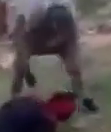 |
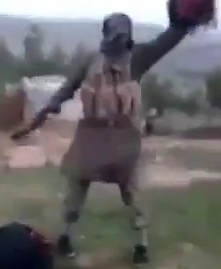 |
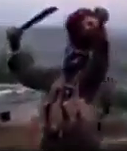 |
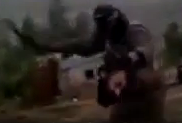 |
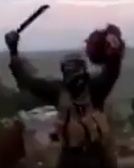 |
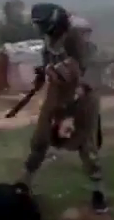 |
 |
Footnotes
1. The figure of 70,000 dead, has been provided by the so-called Syrian Observatory for Human Rights (SOHR) which is opposed to the Government of President Bashar al-Assad, and so has an obvious motive to either fabricate death tolls or to inflate deaths resulting from actions by the Syrian Army (or the Syrian Arab Army to use its full name). However the toll in Syrian military and civilian dead cannot be light and, judging from the staggering death tolls of many hundreds of thousands dead in Iraq following the illegal 2003 invasion, the toll stands to become much higher, should the Syrian Army be defeated.
Murder of 42 in mosque bombing a continuation of the war against the Syrian people
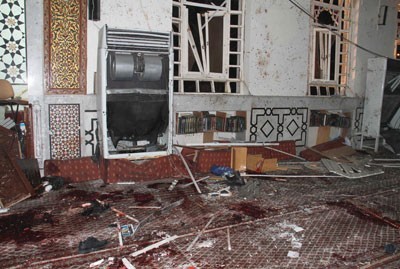
The Syrian people have barely been able to come to terms with with their grief at the murder of 35 in an attack with chemical weapons, when the war against them, sponsored by the U.S., it's European NATO allies, Saudi Arabia, Qatar and Israel, resumed with a terrorist suicide bombing
Almost two dozen more Syrians including top Sunni cleric Mohammed Saeed Ramadan al-Bouti were killed in a terrorist blast at the al-Eman Mosque in Damascus.
The report has been adapted from the Syrian Arab News Agency (SANA).
See also: Suicide bomber kills pro-regime cleric in Syria: TV in PressTV of 21 Mar 2013,
18 Killed Including Top Cleric as Suicidal Blast Rips Apart a Mosque in Damascus of 22 Mar 2013,
Senior cleric, others killed in Syria mosque bombing of 21 Mar 2013,
Syria: Top Sunni preacher among 42 killed in suicide bombing inside mosque of 21 Mar 2013,
Damascus mosque attack kills top cleric: Syria TV of 21 Mar 2013,
Suicide bomber kills pro-regime cleric in Syria: TV of 2 Mar 2013
DAMASCUS, (SANA)-Great Scholar, Dr. Mohammad Said Ramadan a-Bouti was martyred on Thursday after a suicide terrorist blew himself up in al-Eman Mosque in Damascus while the late martyr was giving a religious lesson.
The terrorist act claimed the lives of scores of prayers, while tens others were injured.
An official source told SANA that the suicide terrorist intended to blow himself up among the students who were listening to a religious lesson, leading to the martyrdom and injuries of scores of people and causing big material losses.
A source at the Health Ministry stated that the death toll of the terrorist act rose to 42, while 84 others were injured.
The wounded prayers were admitted to a number of Damascus hospitals.
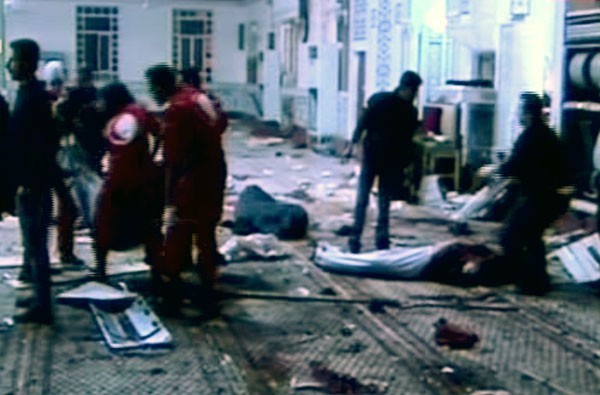
See original report in SANA for more grim images.
Biography
Martyr scholar al-Bouti was born in 1929. He accomplished his Sharia Baccalaureate certificate at the Islamic Tawjih Institute in Damascus.
In 1953, he joined al-Sharea Academy at al-Azhar University and acquired the global certificate in 1955, then he got a diploma in education in the same year.
He was appointed as a teacher in Al-Sharea Academy at Damascus university in 1960, then he was delegated to al-Azhar university to get the doctorate in the Islamic Sharea Originals and got it in 1965.
In 1965, he was nominated as a professor in al-Sharea Academy at Damascus University in 1965, then a dean and chairman of the religions sector at the University.
In 2012 he was nominated as President of the Levant Scholars' Union.
Member of the Higher Council of Oxford Academy.
He wrote more than 40 books in the sciences of Sharea, literature, philosophy, society and civilization.
Ministry of Awkaf announces the death of Scholar al-Bouti
Ministry of Awkaf ( Religious Endowments ), Syria scholars, intellectuals, teachers and the Levant Scholars' Union announced the death of scholar al-Bouti who was martyred while giving a religious lesson in al-Eman mosque.
"The malicious hands of traitors killed the great Scholar because he was the voice of Syria, the right of Syria and the image of Syria. They targeted his body, but they didn't target his mentality or spirit," Minister of Awkaf Mohammad Abdul-Satar al-Sayyed said in a statement.
Al-Baath Party Condemns the heinous Crime
Regional leadership of al-Baath Arab Socialist Party condemned the brutal crime in al-Eman mosque in Damascus which claimed the lives of the great scholar and the prayers.
"This massacre adds to the crimes perpetrated by the mercenary terrorists against the Syrians. They target everything including the mosques and houses of worship," the leadership said in statement.
Archbishop al-Khouri: al-Bouti will remain the word of right
Archbishop Luka al-Khouri, the general vicar of the patriarchate of Antioch and all the East said that the late scholar al-Bouti will remain the word of right that we have learned from. His teachings will remain remembered in the brains of all Syrians.
"We all pray for the rest of our martyr whom we respect..," Archbishop Khouri said in a speech to the Syrian TV.

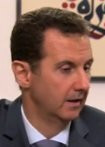

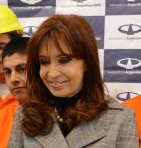
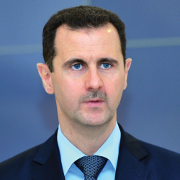
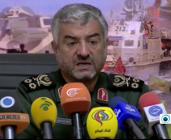
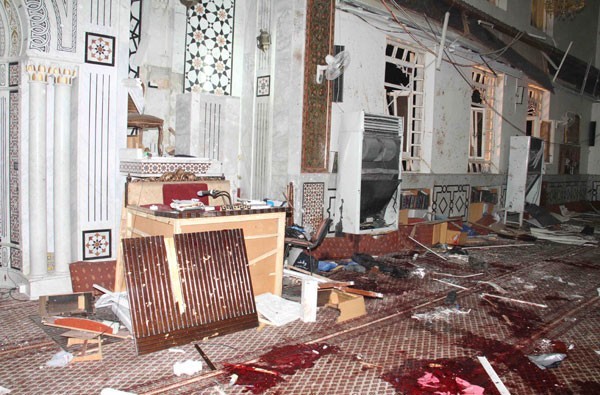
Recent comments